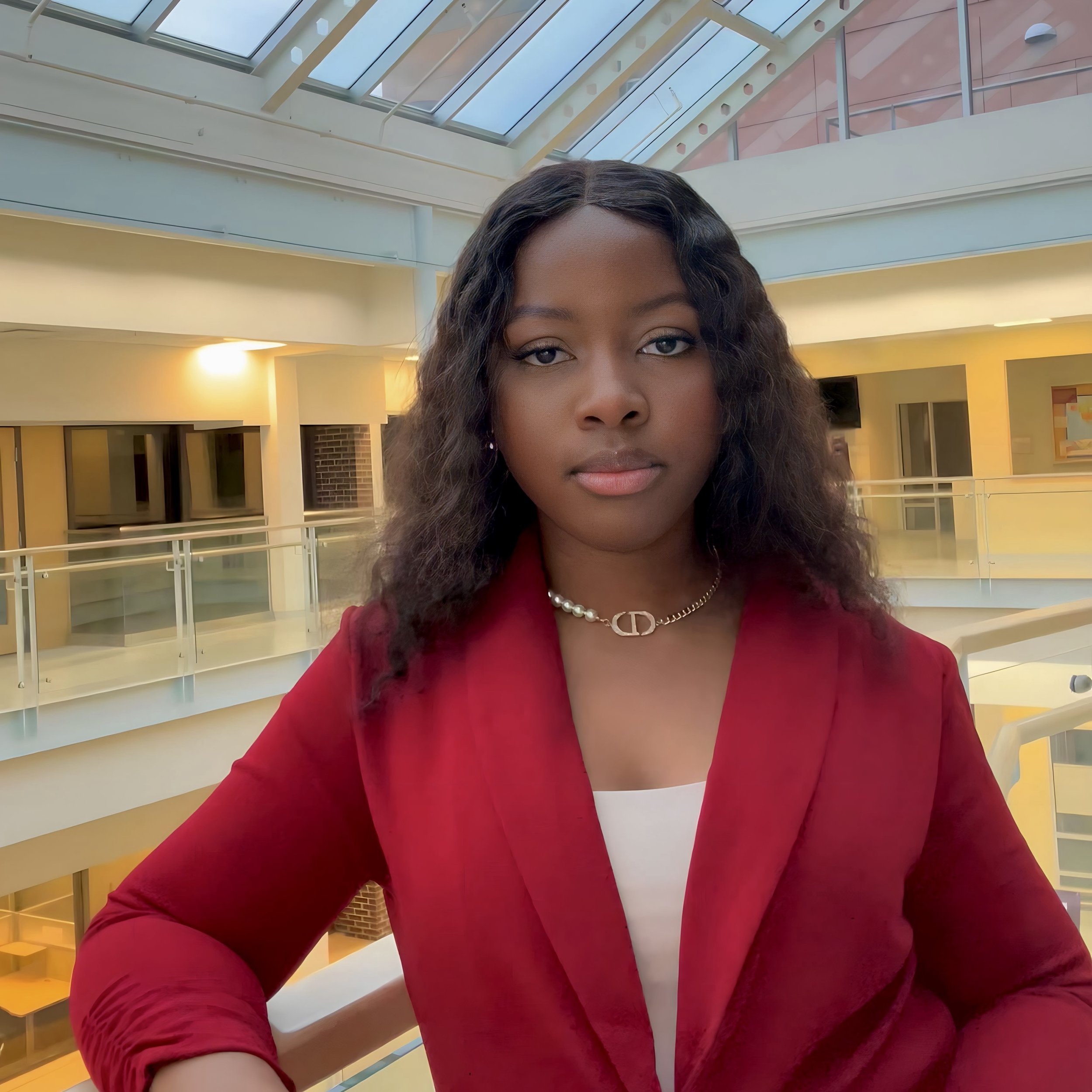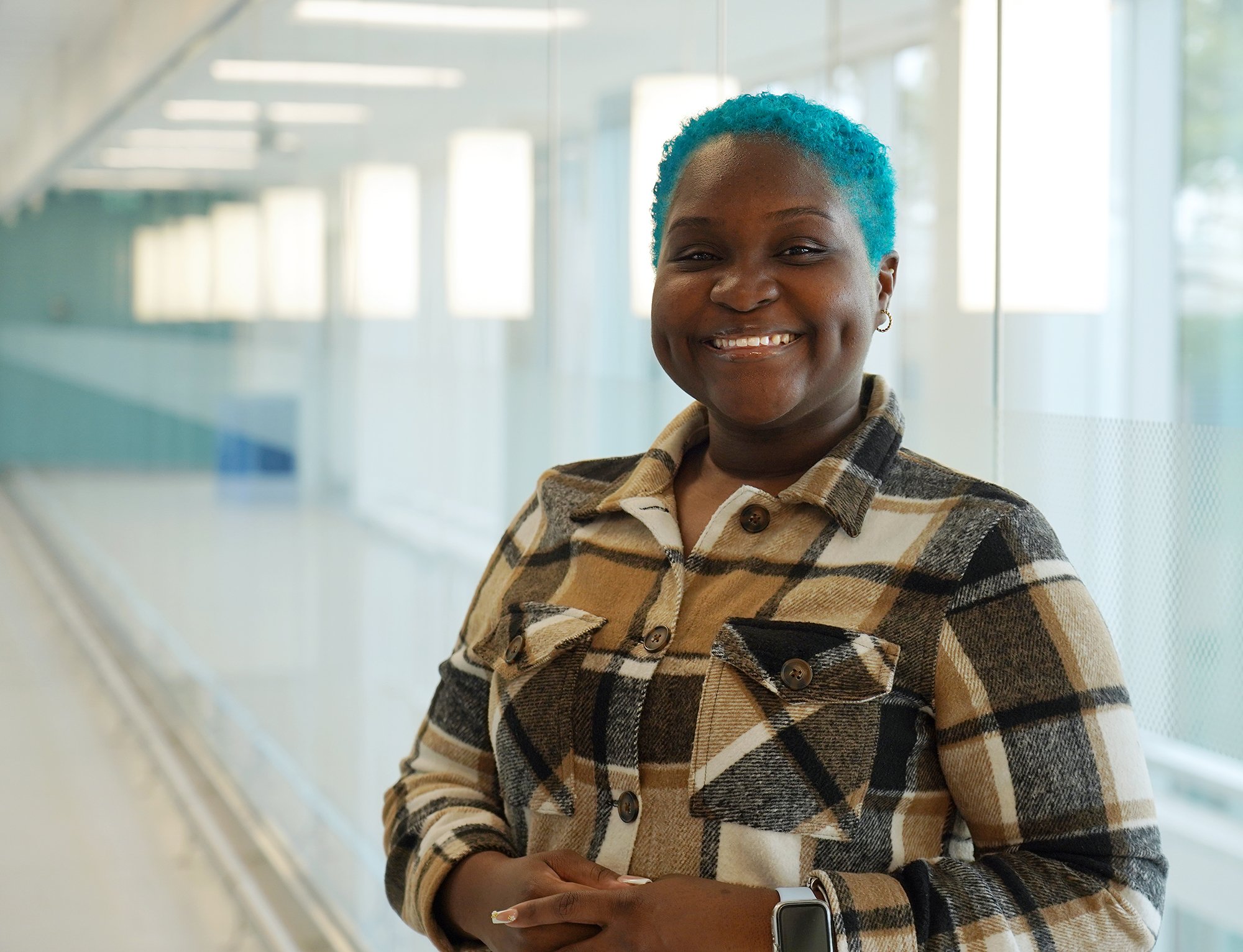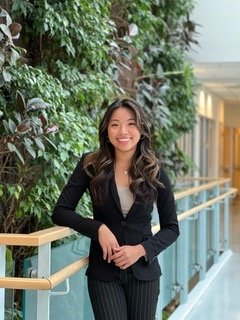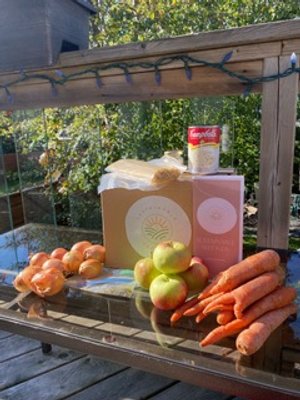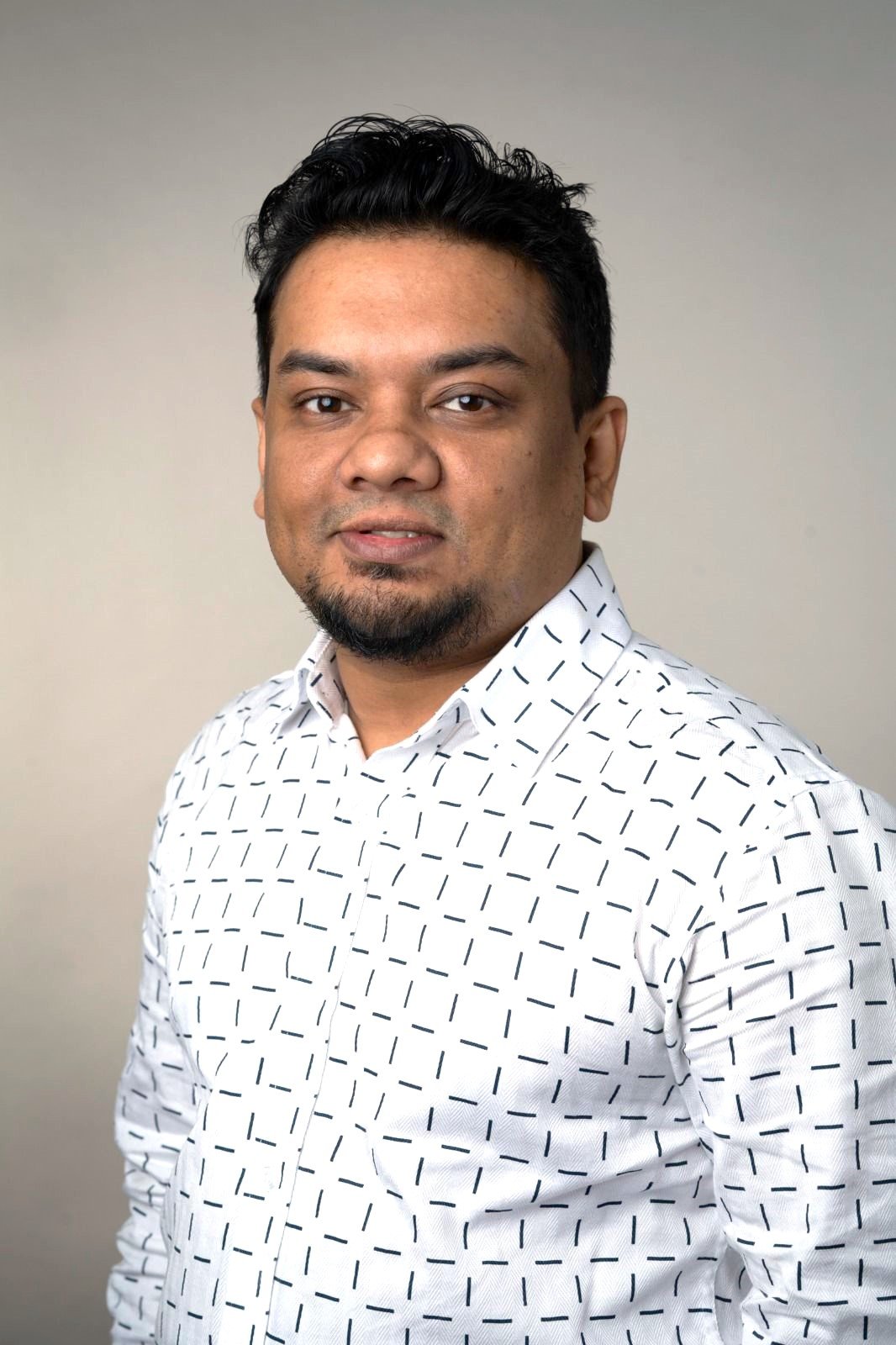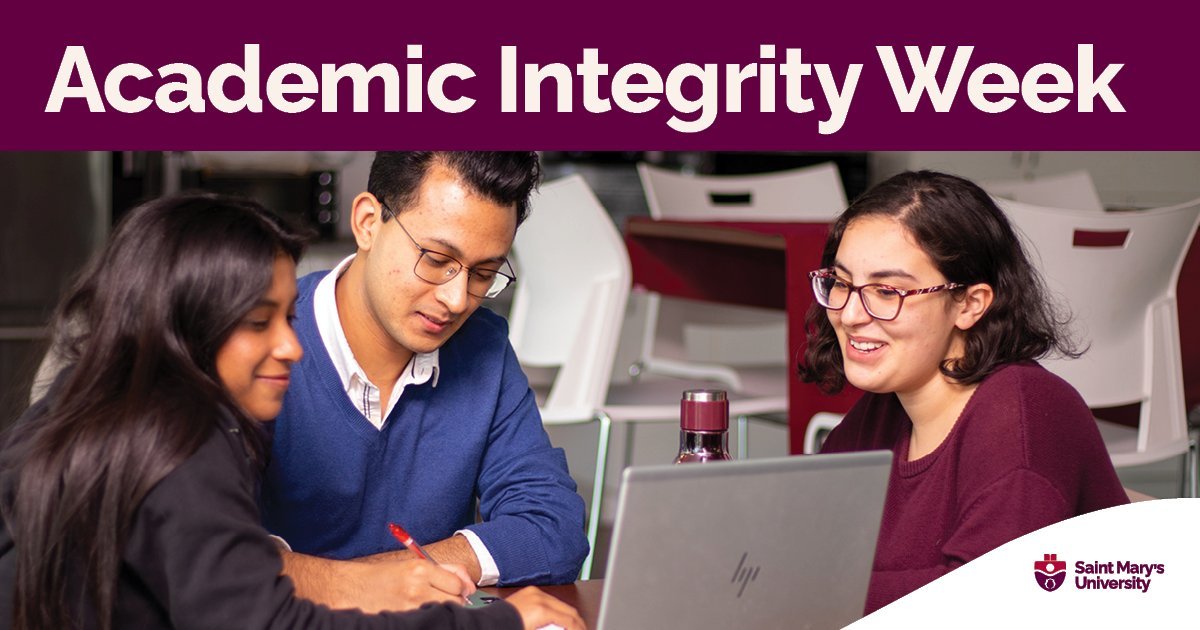Students excel in Venture Capital Investment Competition
Students from the Sobey School of Business gained valuable real-world experience and excelled in the recent Venture Capital Investment Competition (VCIC) New England Regional Final held in Boston.
The graduate team, composed of students from the MTEI (Master of Technology Entrepreneurship and Innovation) and MBA programs, took home a top award. “Entrepreneurs and start-ups participate at these events and they determine the winners for Entrepreneurs Choice. Our team won due to their ability to communicate and connect,” says the team’s advisor, Brennan Daley of the Arthur L. Irving Entrepreneurship Centre.
Gurprit Singh, MBA student
“Being part of VCIC in Boston was a truly transformative experience for me, giving me a real-world view of venture capital, pushing my critical thinking ability and exposing me to the vibrant Boston entrepreneurial ecosystem,” says MBA student Gurprit Singh. “The experience is not just a competition, but a stepping stone into the dynamic world of venture capital, shaping my skills and expanding my network in venture capital.”
Saint Mary’s participates annually in the Global Venture Capital Investment Competition (VCIC), the world’s largest venture capital competition with over 120 university and graduate school teams competing. VCIC is the only place where students get to be VCs for the day, and startups get an immersion in the fundraising process. The SMU teams compete against U.S. universities in the Northeast region and are judged by their preparation and thoughtful execution as a VC firm.
Top (L-R): Sorav Sogy, Ankit Mittal. Bottom (L-R): Shakkharatul Haque Mehad, Jacky Chiu, Shri Subramanian, Gurprit Singh, Sruthi Ganesapandian, Jack Poirier, Sidney Nuwahereza, Oscar Lu, Brennan Daley.
Sorav Sogy, BComm student
Bachelor of Commerce student Sorav Sogy says, “It's not studying; you're actively managing a Venture Capital (VC) fund as an associate. This involves making investment decisions, raising funds, attending conferences and building crucial relationships with entrepreneurs and VCs. You're making a real impact by working alongside industry leaders, facilitating co-investment deals, and learning directly from senior partners and associates at local VC firms. It’s as real as it gets.”
The university’s excellence in venture capital is well established through consistent winning performances in global competitions, expert faculty dedicated to mentoring students, and successful graduates who often pursue careers in this exciting field.
Mark Raymond, Interim Dean of the Sobey School of Business, notes that the teams from Saint Mary’s are the only Canadian teams competing at this elevated level against teams from prominent U.S. universities including Babson, Dartmouth and Notre Dame. “We are known for giving our students amazing opportunities. This is an example of how SMU students gain an entrepreneurial mindset and are equipped with the knowledge, insights, real work experiences and network to lead and make a positive impact.”
Saint Mary’s students, staff and faculty are paying it forward by hosting a national competition in Halifax in March for other Canadian teams who would otherwise not gain these lessons in entrepreneurship and innovation. "Hosting the Canadian regionals provides an opportunity for students from other schools to compete and engage with our vibrant entrepreneurial ecosystem," notes Daley.
Finance students excel in global competition
The Saint Mary’s team earned eighth place for Canada in the 2023 Bloomberg Global Trading Challenge
Saint Mary’s University students gained valuable real-world experience that will help propel them into careers in capital markets and investment banking, by participating in the 2023 Bloomberg Global Trading Challenge. The Saint Mary’s team, comprised of students in the Sobey School of Business, finished eighth in Canada, 42nd in North America and 113th in the world out of 2,007 teams.
Teams from 309 universities and business schools faced the same challenge: use Bloomberg Terminals to invest $1 million virtual USD and be ranked on the profit/loss margin. “We were nervous,” says Master of Finance student Ifrahim Iftikhar. “We did not want to lose the $1 million (virtual) in the first two or three weeks.”
Team Captain Rehan Habib and the team members Nancy Naadei Kotei-Sass, Ryan Macalalad, Suja R.J. Vikas and Ifrahim Iftikhar are all from the prestigious Master of Finance program. They taught themselves how to use the Bloomberg Terminals from online videos and other resources provided by Bloomberg Education.
Influenced by world events, the students initially took a defensive position and followed a safe 60/40 diversification strategy focused on U.S. stocks, but soon found they were only matching the WLS index (Bloomberg World Large, Mid & Small Cap Price Return Index) which was underperforming at the time. They needed a change in direction to maximize returns over the short, six-week span of the competition.
“Our diversity was a distinct advantage, says Rehan Habib. “ With team members from several countries including India and Pakistan, we had multiple perspectives and important sector insights.”
“We identified that the Indian stock market was doing extremely well, and the Pakistan market was at a historic high,” explains Suja Vikas. “We analysed the market and decided collectively how much risk we could take.” The strategy succeeded and the team secured a $65,000 lead by the competition's end.
Faculty mentor, Dr. Florian Muenkel, says that the competition is particularly valuable for the students studying in the Sobey School of Business. “It’s practical experience. Students learn how to take a large set of assets and identify which ones have the best potential. They learn that we are all exposed to behavioural biases, and they learn how to overcome them. At the same time, they browse the news and consider macroeconomics and political risk.”
He notes that the Saint Mary’s team was successful due to teamwork—they were able to divide up the tasks and make decisions. “You have to rely on your team; they worked well together.”
Nancy Naadei Kotei-Sass says, “I learned a great deal—how to handle the Bloomberg Terminal and how to trade. Trading in a short period requires a lot of strategies because the market can be your friend today and an enemy tomorrow.” Ifrahim Iftikhar expressed a similar sentiment. “We found that good news such as strong company performance did not necessarily translate into a stock price increase. There were other factors at play. It was an eye-opener.”
Ryan Macalalad says, “The mentorship of faculty members, Dr. Florian Muenkel and Dr. Rahman Khokhar, extended far beyond the four walls of the classroom, inspiring us to explore our potentials as traders, face challenges and strive for excellence. Their encouragement and advice throughout the trading challenge was instrumental in the team’s success."
8,400 students across 38 countries competed in the 2023 Bloomberg Global Trading Challenge, testing their skills in investing $1 million virtual USD. The global event is supported by the research and analytics team at Bloomberg for Education.
The Bloomberg Global Trading Challenge tests students annually on generating the highest relative profit and loss return (P&L) via Bloomberg Terminals. Each team is accompanied by a faculty advisor.
Student Leadership Conference 2024
The 2024 Student Leadership Conference will take place on March 2, 2024. Come learn new skills, hear from inspiring speakers and have fun meeting new people. This one-day conference is open to all SMU students and includes opportunities to connect with peers, build your leadership skills and have some fun along the way. The day will feature a leadership primer, discussions with current and emerging student leaders and an inspiring keynote speaker.
The SMU Student Leadership Conference will bring together students from across campus to connect, learn, laugh and be inspired.
All students are encouraged to attend, whether you are already involved in leadership activities or just getting started on your leadership journey. You don’t want to miss this.
The Early Bird Registration deadline is February 9th. Space is limited. Register early to be entered to win one of three $25 SMU Bookstore Gift Cards! The first 100 people who register will receive a free leadership starter kit, including a Saint Mary’s leadership padfolio and guide. Kits and gift cards will be distributed at the conference. Participants must be present to claim theirs.
Why attend the Student Leadership Conference 2024?
Conference participation is CCR eligible, and all participants will receive a certificate of completion at the end. This looks great on the resume and gives valuable references on the cover letter.
The conference gives students the opportunity to participate in fun and interactive sessions, gain valuable insights and network with like-minded individuals.
There will be prize giveaways throughout the day.
Lunch is provided.
Event Details
Date: March 2nd, 2024
Time: Doors open at 9 a.m. (check-in required at the front desk)
Conference runs from 10 a.m. - 4 p.m.
Location: Loyola 290
Registration Is Now Open!
Register to attend the Student Leadership Conference on March 2nd, 2024!
Conference Schedule
9-10 a.m. | Check-In and Coffee
10-10:15 a.m. | Opening Remarks and Overview of the Day
10:15-11 a.m. | Leadership Primer by Tom Brophy
11 a.m.-12 p.m. | Keynote Address
12-1 p.m. | Lunch (included in registration)
1-1:50 p.m. | Concurrent Sessions
1:50-2 p.m. | Break
2-2:50 p.m. | Concurrent Sessions
2:50-3 p.m. | Break
3-3:30 p.m. | Student Leader Panel
3:30-4 p.m. | Closing Remarks and Ice Cream Social
Questions? Email studentsuccess@smu.ca
Transitioning from Co-Curricular Record to new Experience Record
The Saint Mary’s Co-Curricular Record (CCR) program has helped thousands of students connect with, track and validate co-curricular experiences including on- and off-campus volunteering, professional and personal development, leadership, student societies, awards and certificates, and sports and recreational opportunities.
Through the CCR program, students track hours, complete reflections and identify competency development using the university’s Career360° platform. Students use the record during their job search process or for further education or scholarship applications.
As the world of co-curricular and experiential learning evolves, Saint Mary’s University is transitioning from the former Co-Curricular Record model to our new Experience Record model. The Experience Record is a comprehensive document that summarizes a student’s involvement in curricular and co-curricular experiential learning at Saint Mary’s University. “Co-Curricular Record” is now defined as “Co-Curricular Recognition”, and all co-curricular programming will remain the same. Verified Co-Curricular Recognized (CCR) experiences will be documented on the Experience Record.
Some experiences will be automatically populated on a student’s Experience Record through Career360°, while others are submitted via the Co-Curricular Recognition (CCR) Program. The Experience Record includes verified experiences: Co-Curricular Recognized activities, Service Learning, Co-operative Education, Student Employment Initiative, Events/Workshops, Micro Experiential Learning, and more.
The new Experience Record model allows students to publish and sync their Experience Record to their LinkedIn profile in the Licenses and Certifications section. They can also access a URL link to the Record, which can be added to their cover letter or resumé.
For questions or inquiries on how to get involved with the CCR or Experience Record, contact Christy Starkey at Christy.Starkey@smu.ca.
Meet your Valedictorians for Winter 2024
Three valedictorians, selected for their leadership, campus involvement and academic success, will address their fellow graduates at the Winter Convocation ceremonies taking place on January 26 and 27, 2024. These students are the recipients of a John and Heather Fitzpatrick Valedictorian Award.
Learn more about the Winter 2024 valedictorians, and watch the ceremonies live at smu.ca/graduation.
Sheldon Bhawanie, Master of Technology Entrepreneurship and Innovation
Sheldon Bhawanie, Valedictorian for the Faculty of Graduate Studies and Research
Sheldon Bhawanie left his home in Trinidad and Tobago and arrived at Saint Mary’s after searching for the best business school in Atlantic Canada. Needless to say, the Sobey School of Business came out on top and Sheldon has never regretted his choice. His degree, a Master of Technology Entrepreneurship and Innovation, has given him the foundation for a successful career and so much more.
Sheldon is currently employed at the Sobey School of Business as a Professional Development Project Manager in Graduate Career Services and volunteers as a soccer coach at the Halifax City Soccer Club. Working with students, helping them navigate their education journeys and enriching their lives has become a calling. “We are here not only to exist but also to make life better for others.”
Q&A with Sheldon
Why did you choose Saint Mary’s University?
I had attended St. Mary’s College in Port of Spain and had dedicated a significant part of my life to volunteering there. When I was looking for a good business school to attend in the Maritimes, it was no coincidence that SMU came up—I was sold! From one St. Mary’s to the next.
Tell us how you got involved in the SMU Community
I volunteer as a mentor for the Innovation Sprint events hosted at the Arthur L. Irving Entrepreneurship Centre. I think the clarity with which I see problems can help others solve problems.
Looking back, what was your favourite Saint Mary’s memory?
I remember coming to SMU for the first time in August 2022 and just standing in the Atrium thinking that I did well to get into my program and that I had to make my mark here. I couldn’t believe I was going to be part of the tapestry of this university. That moment is etched in my memory forever.
How has the MTEI helped shape your success in Halifax?
I have made so many connections here, not only as a student but networking with other professionals in Halifax! I learned that networking is key to setting up your landing after graduation. Everyone knows someone and therefore, good connections position you for a fulfilling life.
Funmilayo Chioma Adegoke, Bachelor of Commerce
Funmilayo Adegoke, Valedictorian for the Sobey School of Business
Funmilayo Chioma Adegoke, from Lagos, Nigeria, earned a Bachelor of Commerce with a double major in Accounting and Computing and Information Systems. Her keen interest in the intersection of technology and finance motivated her to pursue these fields, and she is enthusiastic about exploring how technology can transform the accounting world.
Q&A with Funmilayo
Why did you choose Saint Mary's University?
I chose Saint Mary’s because of the Sobeys School of Business and its esteemed reputation as one of the top business schools in Canada.
What was your experience coming to Halifax as an International student?
Transitioning to life away from my family was a new experience, but SMU made it smoother than I expected. The assistance I received encouraged me to get involved and support other students as they transition into the SMU community. I worked with the International Centre and Residence Programming Team to help organize holiday-themed events, offering students on campus during the Christmas break a 'home-away-from-home' experience.
What other ways did you get involved with campus life?
I had many opportunities to get involved on campus, including as a member of the Commerce Society and African Society. I volunteered with the SMU Community Food Room and as a Cultural Assistant for the Language Centre, which paved the way for a rewarding job opportunity.
My first job on campus was with the Patrick Power Library, where I gained invaluable experience. In my second year (during the pandemic), I served as a Resident Assistant, supporting students facing unprecedented challenges and was honoured with a Flexible Leadership Award for my contributions during that time.
Which instructor had the most significant impact on you?
I've been lucky to encounter a few exceptional professors during my academic journey. Professor Charles Baxter sparked my interest in accounting, while Professor Vasiliki Athanasakou helped me gain a new perspective on the subject. Both have been invaluable mentors to me.
What are your goals for the future? How did Saint Mary's help set you on this path?
I am working towards my CPA and have found the CPA prerequisite courses offered by Saint Mary’s to be very helpful in achieving my goal. The resources provided by SMU have enabled me to explore my diverse interests and pursue a second major in Computing and Information Systems.
Celina C.J. Rolle, Bachelor of Arts
Celina Rolle, Valedictorian for the Faculty of Arts
Press on and persevere. This is the message Celina Rolle wants to emphasize in her valedictory words of wisdom to fellow graduates. “Though we stand on top of this hill, many more are waiting to be conquered,” Celina says in her address, which opens and closes with inspiring passages from the Matthias Barr poem “Persevere”.
Celina works as a foreign service officer with the Ministry of Foreign Affairs in The Bahamas. She came to Halifax from Nassau to pursue a Bachelor of Arts with a major in Global Development Studies, building on her previous studies in law and criminal justice at the University of The Bahamas.
Q&A with Celina
Why did you choose Saint Mary’s? After researching different universities, I found that Saint Mary’s stood out the most to me. Its commitment to ensuring that everyone feels welcome resonated with my values. It was also a plus to know several people who have either attended or are currently enrolled at SMU.
What was your favourite course? The Mind-Body Problem (PHIL 2328). After taking this class, I’m still grappling with the question of whether the mind is contained within the brain. It pushed me to think creatively and consider alternative possibilities.
Which instructor had the biggest impact on you? Jean-Blaise Samou, my instructor for Africa: Contemporary Development Issues (GDST 4462). The main responsibility of professors is to encourage students to think critically. However, he went beyond that by motivating us to explore the backgrounds of the authors whose readings we were required to study. This helped us understand how their personal experiences influenced their writing. I have since applied this approach to all my classes and even in my personal life, resulting in a significant impact on my way of thinking.
What will you miss most about Saint Mary’s? I am going to miss every one of my friends dearly. From the moments of pure joy and laughter that we shared to the deep conversations we had, I’m grateful for the time we spent together. I will always cherish those memories.
How has your experience at Saint Mary’s helped shape your future goals? Through interacting with a diverse range of people from different walks of life, I have learned how to communicate effectively, collaborate with others, and appreciate different perspectives. SMU's curriculum is designed to instil a strong work ethic. The rigorous coursework and deadlines taught me to manage my time wisely and work efficiently under pressure. These skills have been very useful in my career, where I am required to handle multiple tasks and meet tight deadlines. Next, I would like to obtain my master’s degree.
Winter Convocation takes place on January 26 and 27, 2024. Watch the ceremonies live at smu.ca/graduation or on our Facebook page.
Students tackle health care, food security issues with Wicked Problem Lab awards
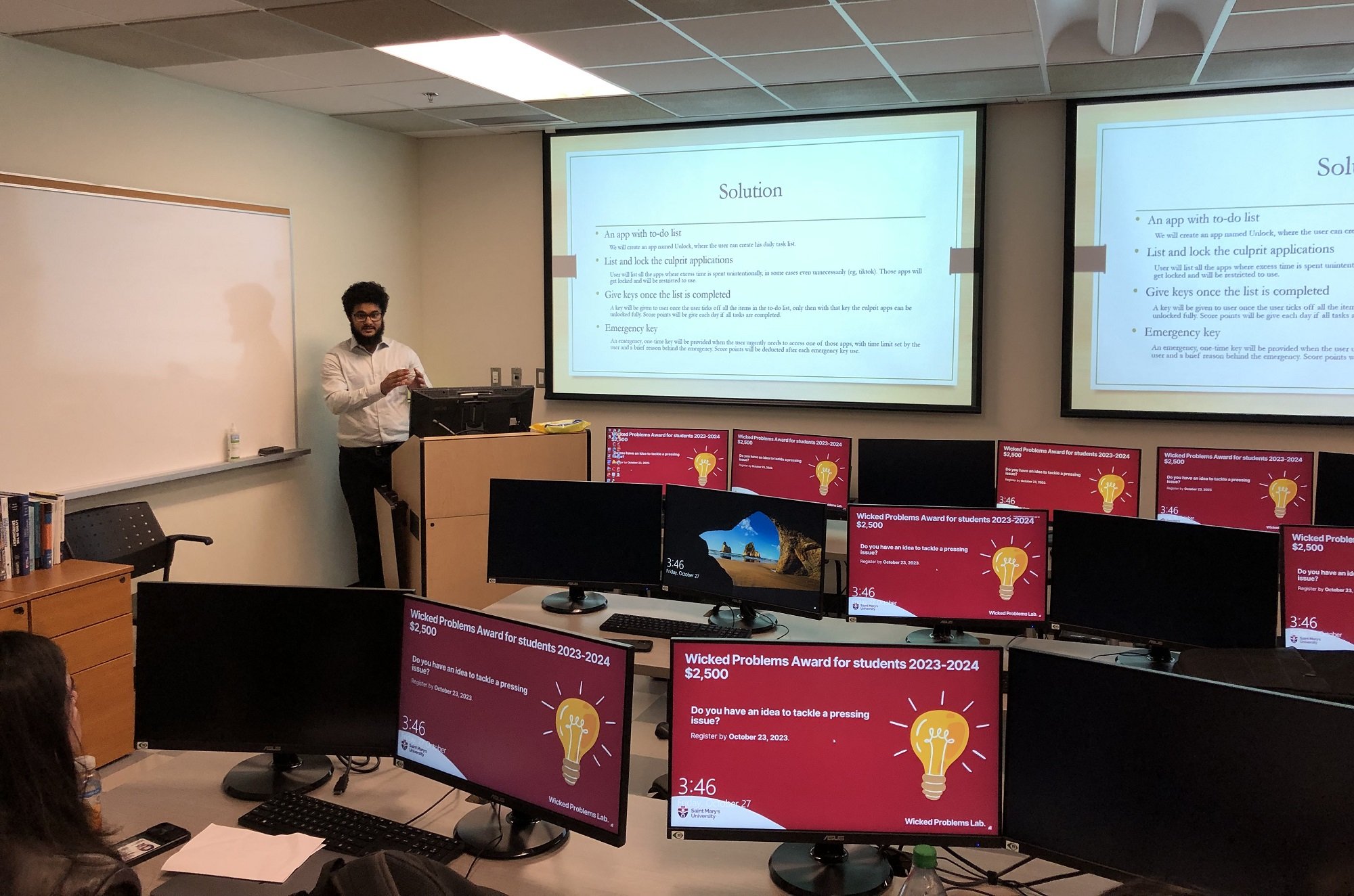
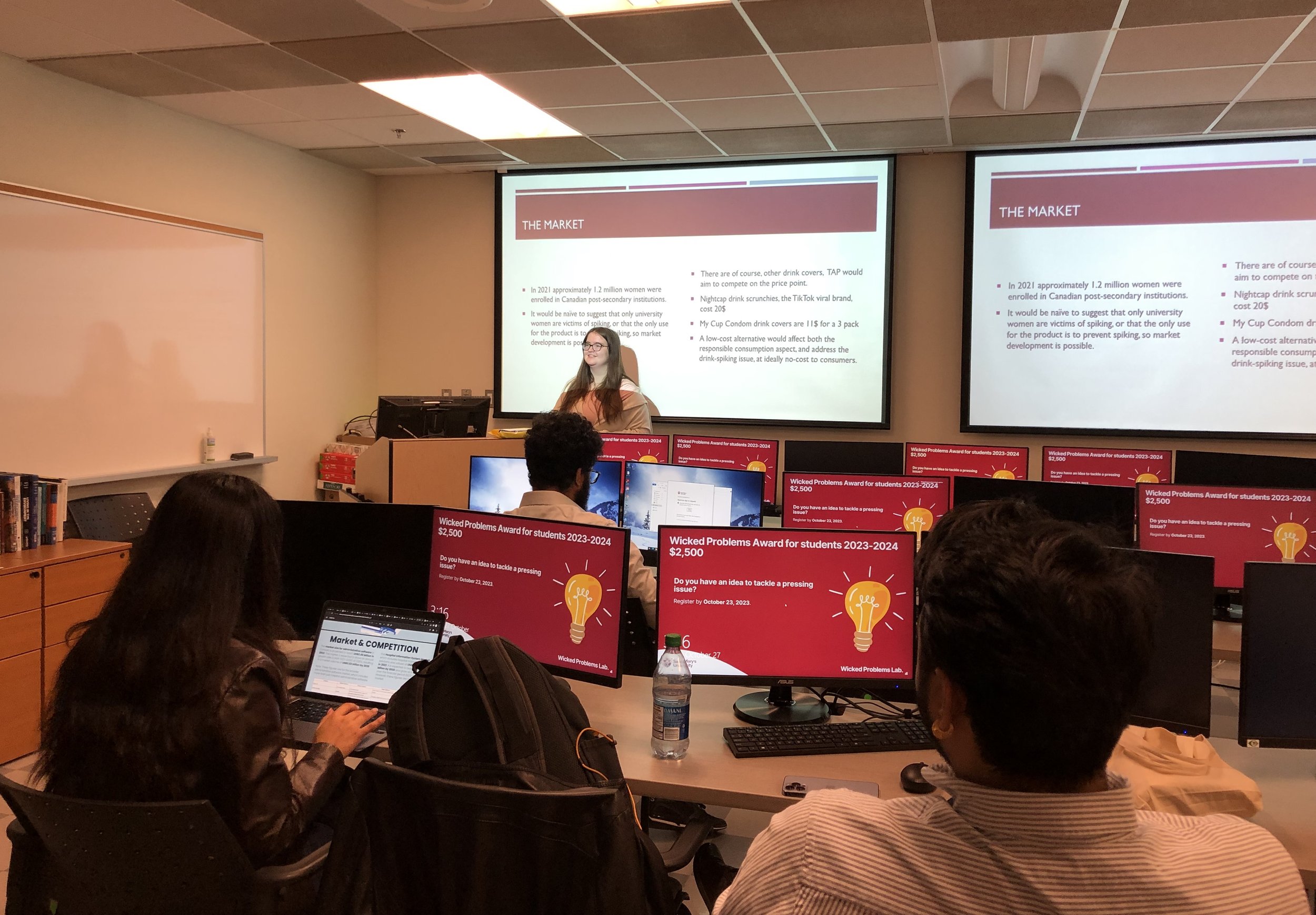
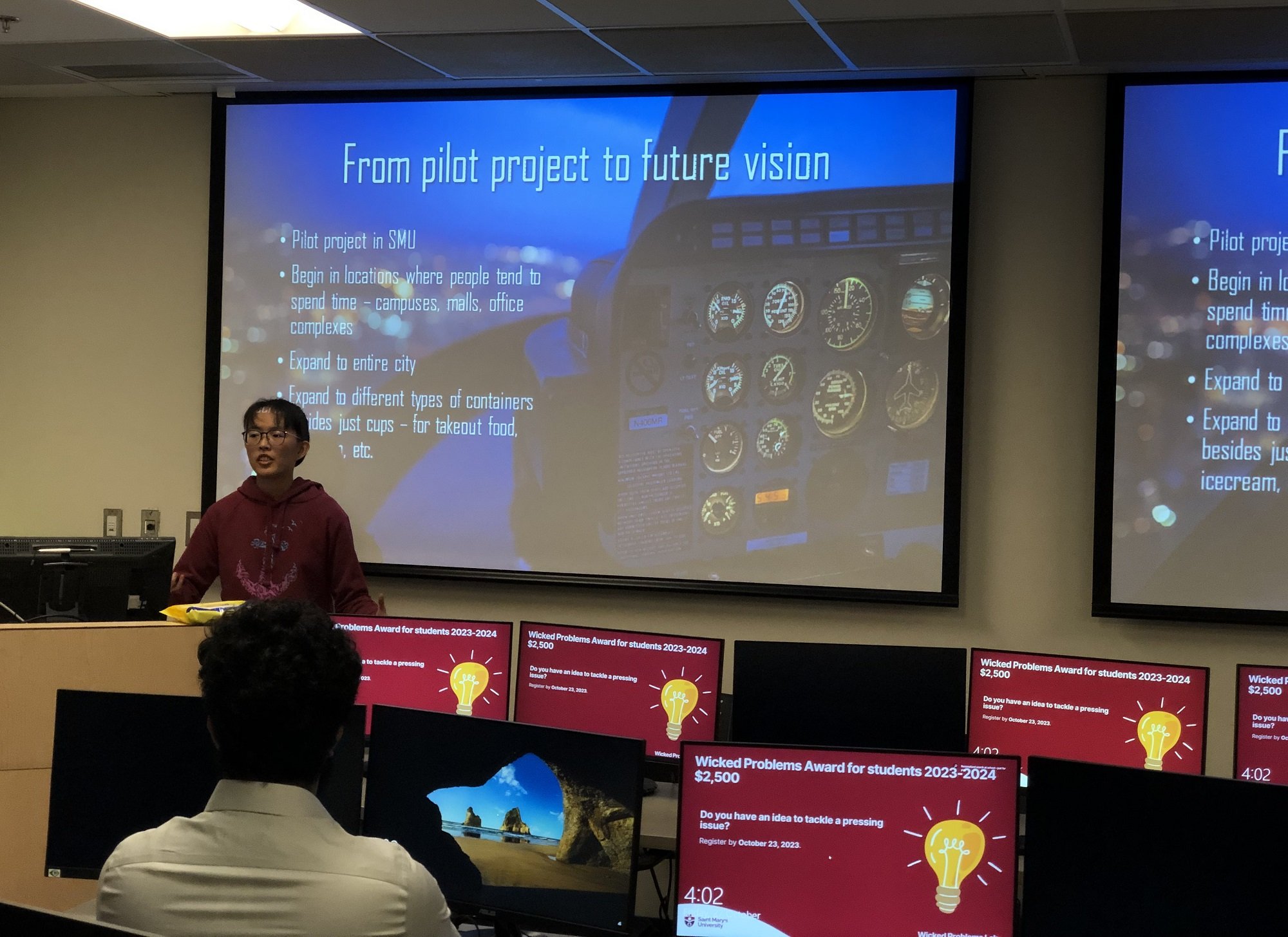
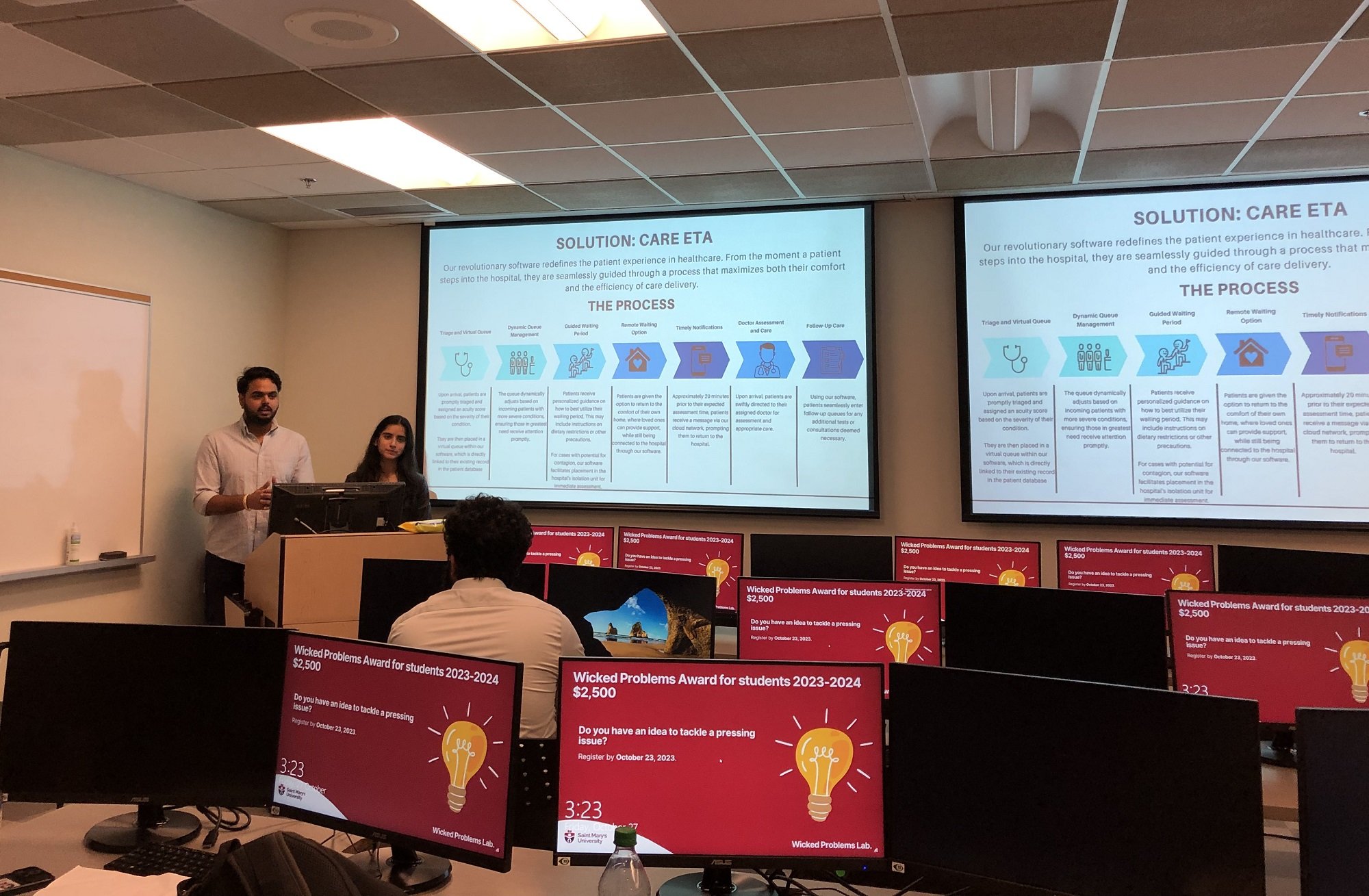

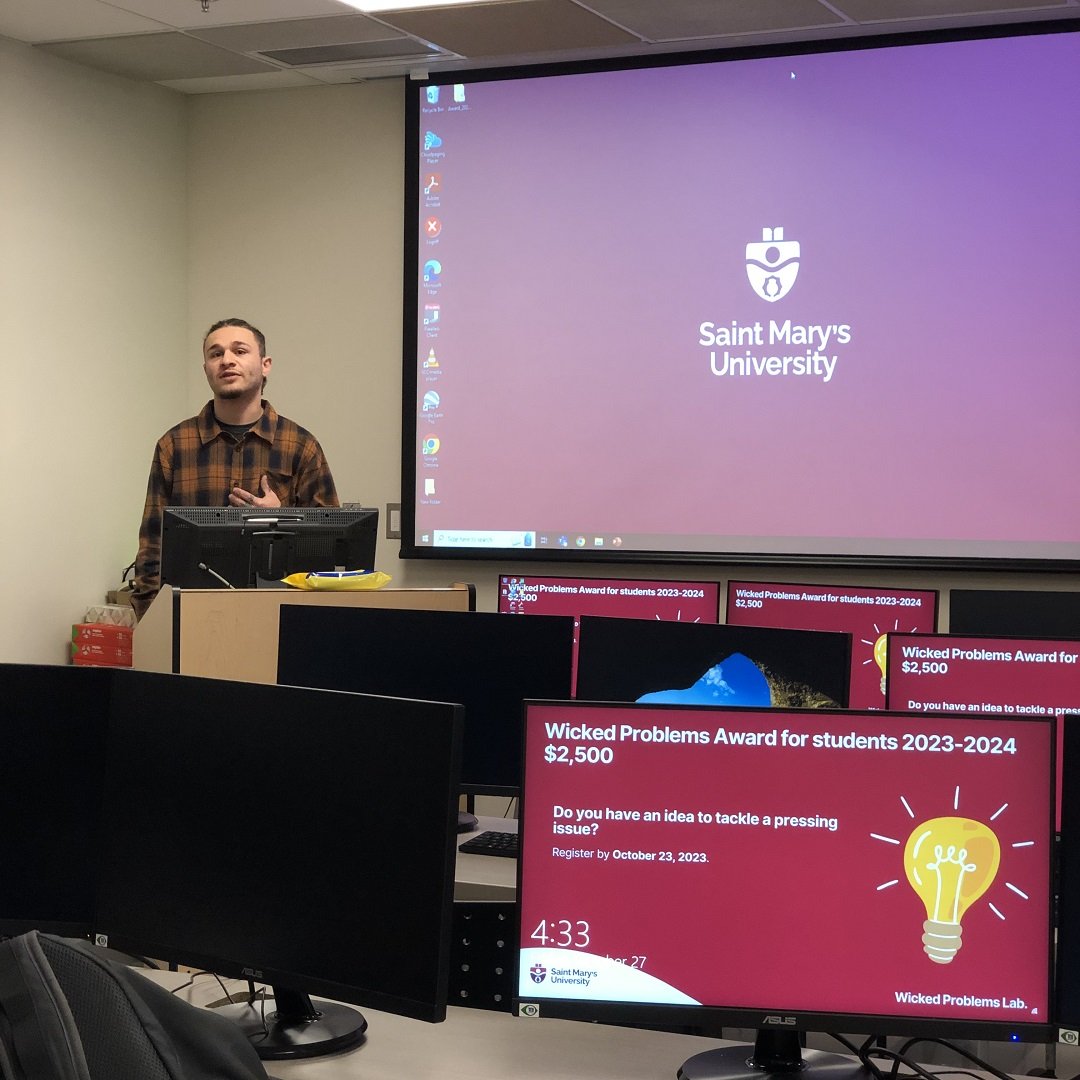
Four Saint Mary’s students are gearing up to tackle some thorny issues in health care, food security and sustainability thanks to an award program from the Wicked Problems Lab.
Now in its second year, the LeaderVision Atlantic Wicked Problems Lab Awards (sponsored by SMU alumnus Douglas Coll BComm’89), provide $2,500 to two undergraduate students who present a compelling idea to address a challenging problem. The Wicked Problems Lab grants two additional awards of the same value to one graduate and one undergraduate student.
“Wicked problems, like poverty or climate change, are by definition almost impossible to solve because they are complex and always evolving, with no real end point,” says Dr. Mat Novak, a professor in the department of Geography and Environmental Studies and director of the Wicked Problems Lab. “But that doesn’t mean we shouldn’t work to address them. These awards inspire and encourage students to work towards solutions.” The Lab supports the students by providing data, analytical software and expertise.
Twelve projects vied for the award this year. The successful candidates began working with Drs. Novak and Matsumoto–the WPL’s Research Analyst–shortly after they were notified of their prize and will continue to develop and implement their idea this winter. Surveys, spatial analysis and census data will help inform their projects along with meeting local partners to carry out their ideas. Students will showcase their projects at the end of the term.
Congratulations to the winners:
Lydia Lee
Bachelor of Commerce, Sobey School of Business
Project: Sustainable Seconds
Sustainable Seconds aims to address food insecurity by delivering affordable and sustainable home meal kits. Using second products from local farmers and donated ingredients to create affordable and sustainable meal packages, it’s a cost-effective solution with pre-measured ingredients and easy-to-follow recipes.
Sorav Sogy
Bachelor of Commerce, Sobey School of Business
Project: CARE ETA
Sorav Sogy, along with fellow BComm students Vaishali Sachdeva, Ishaan Singh and Aarav Sen Mehta, want to tackle healthcare wait times through the development of an interactive app. CARE ETA aims to improve the experience of patients waiting in lengthy queues in emergency hospitals by implementing a real-time system that lets people stay informed about their status.
Melissa Alvarez Del Angel
Bachelor of Science, Psychology major
Project: Palm Oil Reduction and Healthier Food on Campus
Melissa Alvarez Del Angel is promoting healthier food options to the SMU campus. In response to the environmental impact of widespread palm oil production, Melissa has proposed a comprehensive strategy for reducing the use of palm oil and advocating for healthier food alternatives at SMU.
Hasib Ahmed
Master of Technology, Entrepreneurship and Innovation
Project: Wellnex
Hasib Ahmed is developing a platform to make blood collection more accessible. This project seeks to enhance urban and rural mobility by introducing a doorstep blood sample collection service facilitated by a visiting nurse/phlebotomist, eliminating the need for individuals to commute to the hospital.
About the Wicked Problems Lab
Established in 2020, the Wicked Problems Lab harnesses the power of data and advanced analysis to address the world’s wicked problems.
The lab is equipped with the latest software and curated datasets and is staffed with a full-time analyst to help address your wicked problem.
The lab offers:
One-on-one research help
Undergraduate and graduate-level problem-based learning activities
Workshops, seminars and group training
Self-directed tutorials for data and software, including GIS
Community-research help assistance
Student launches Black haircare and beauty supply vending machine on campus
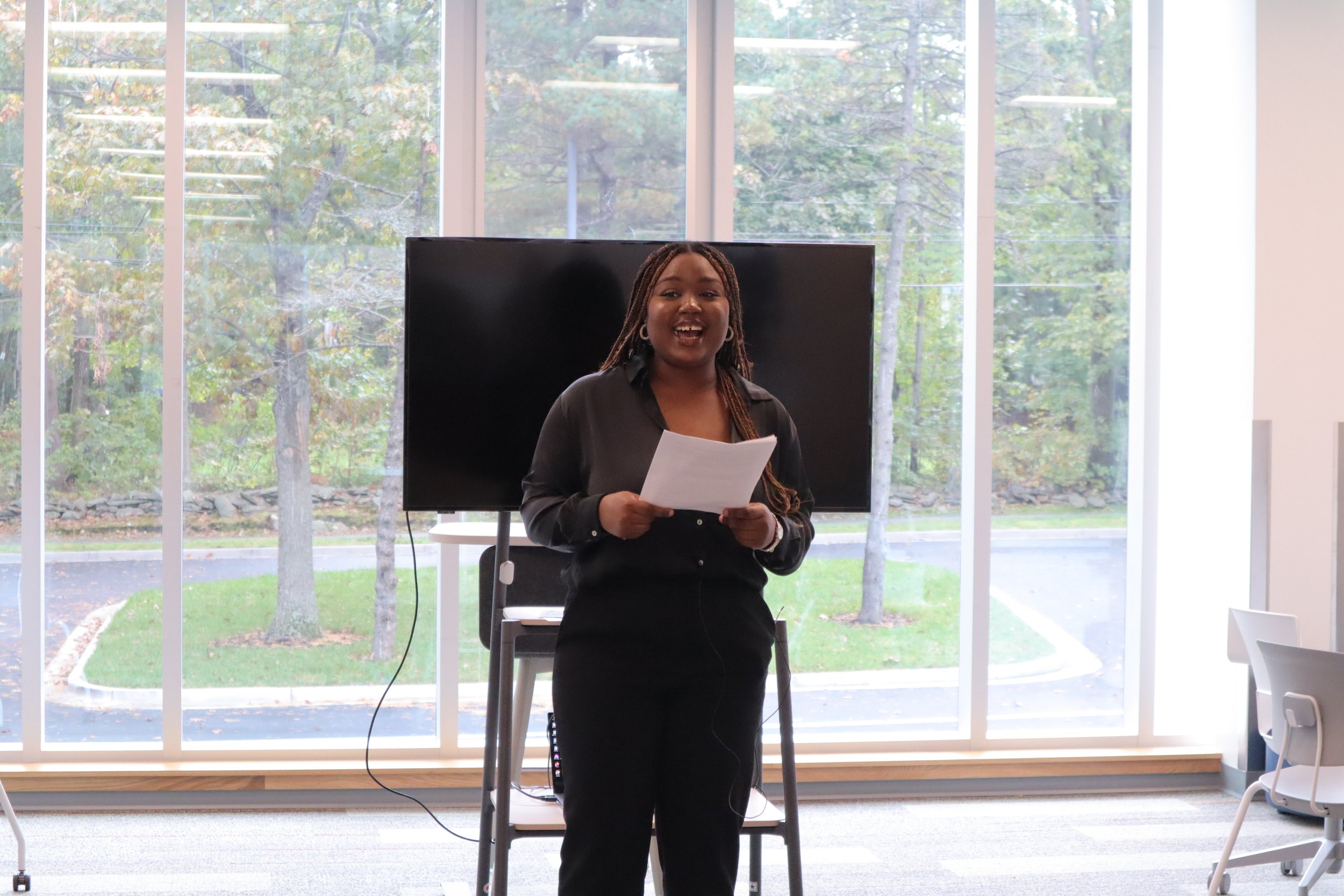
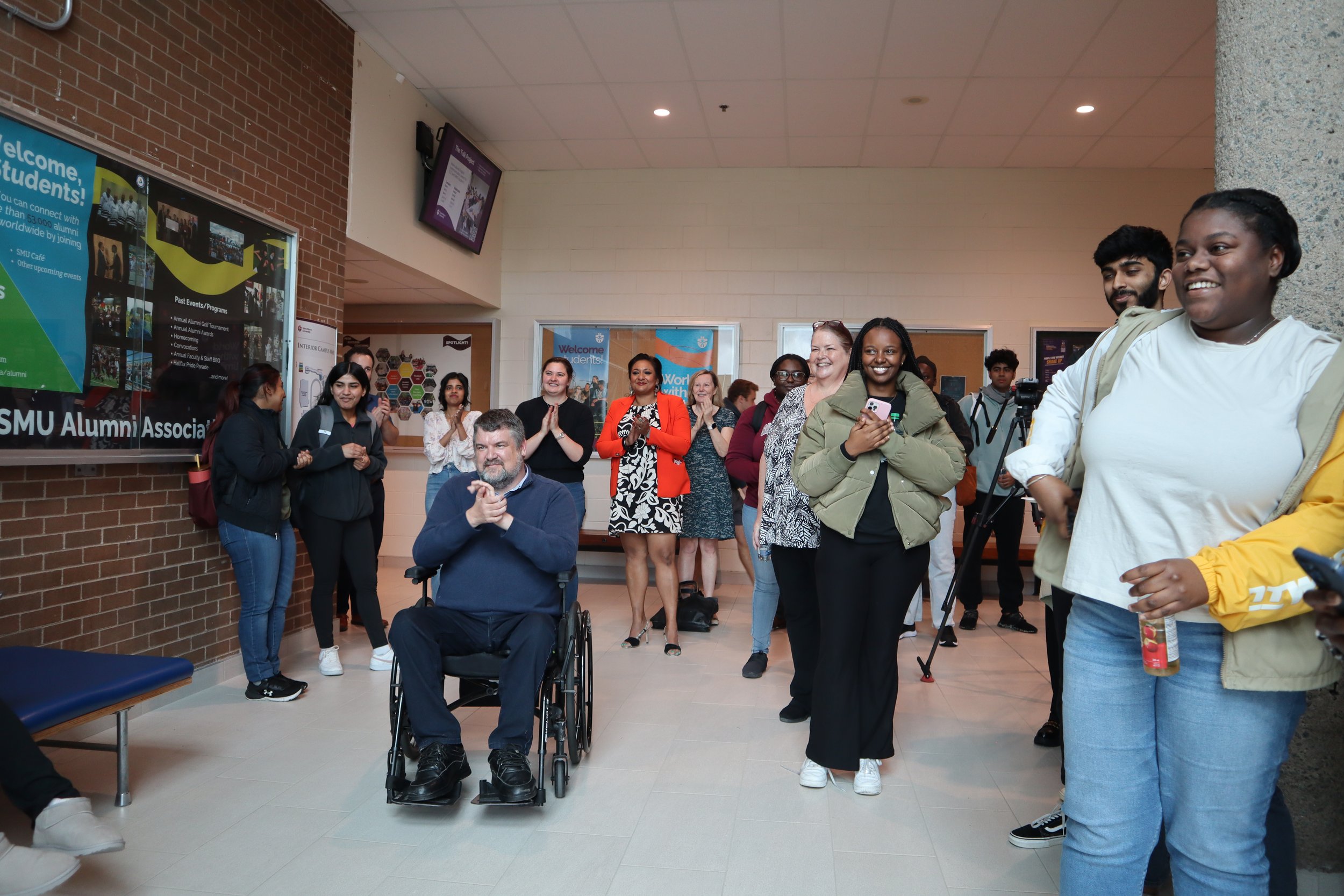

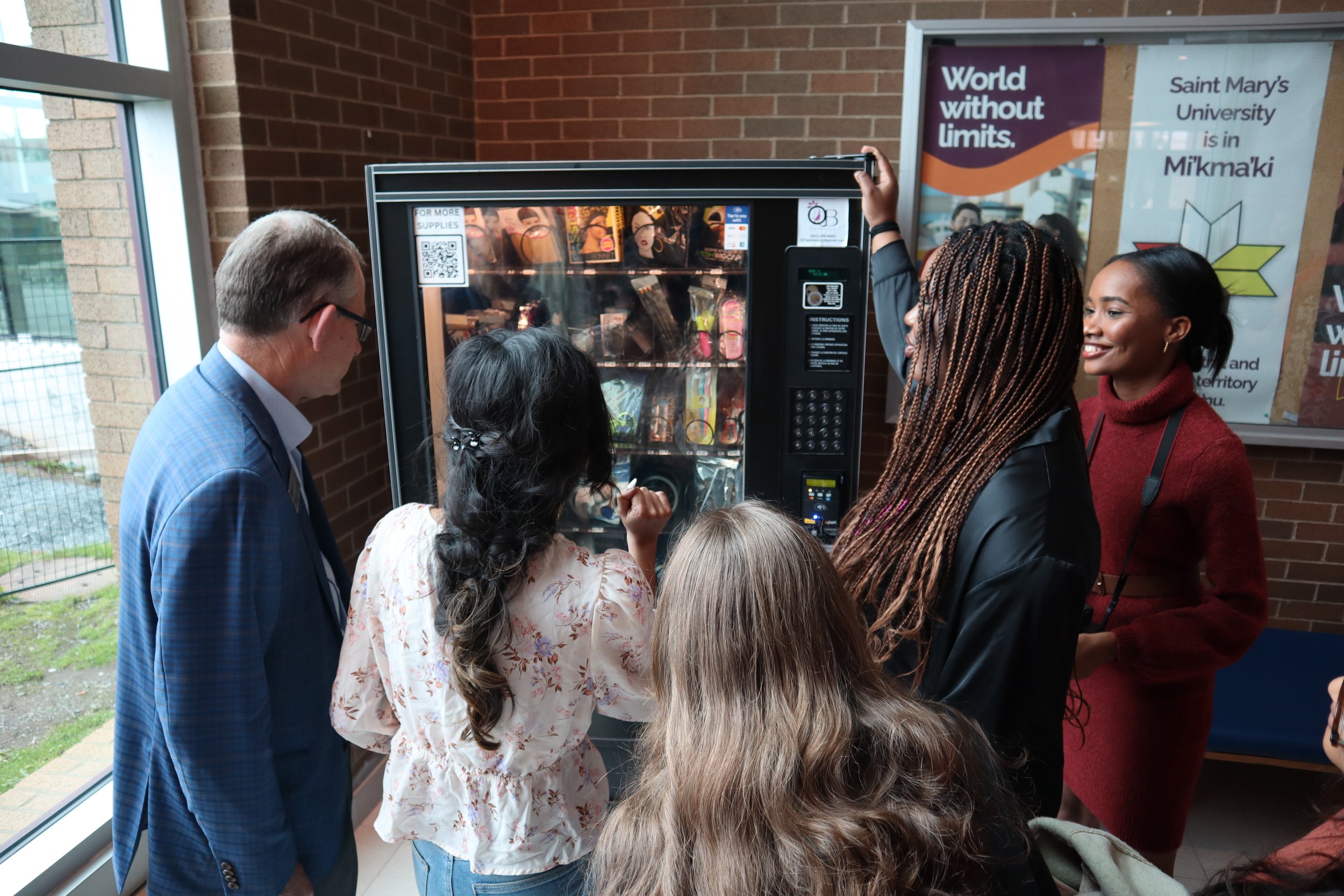
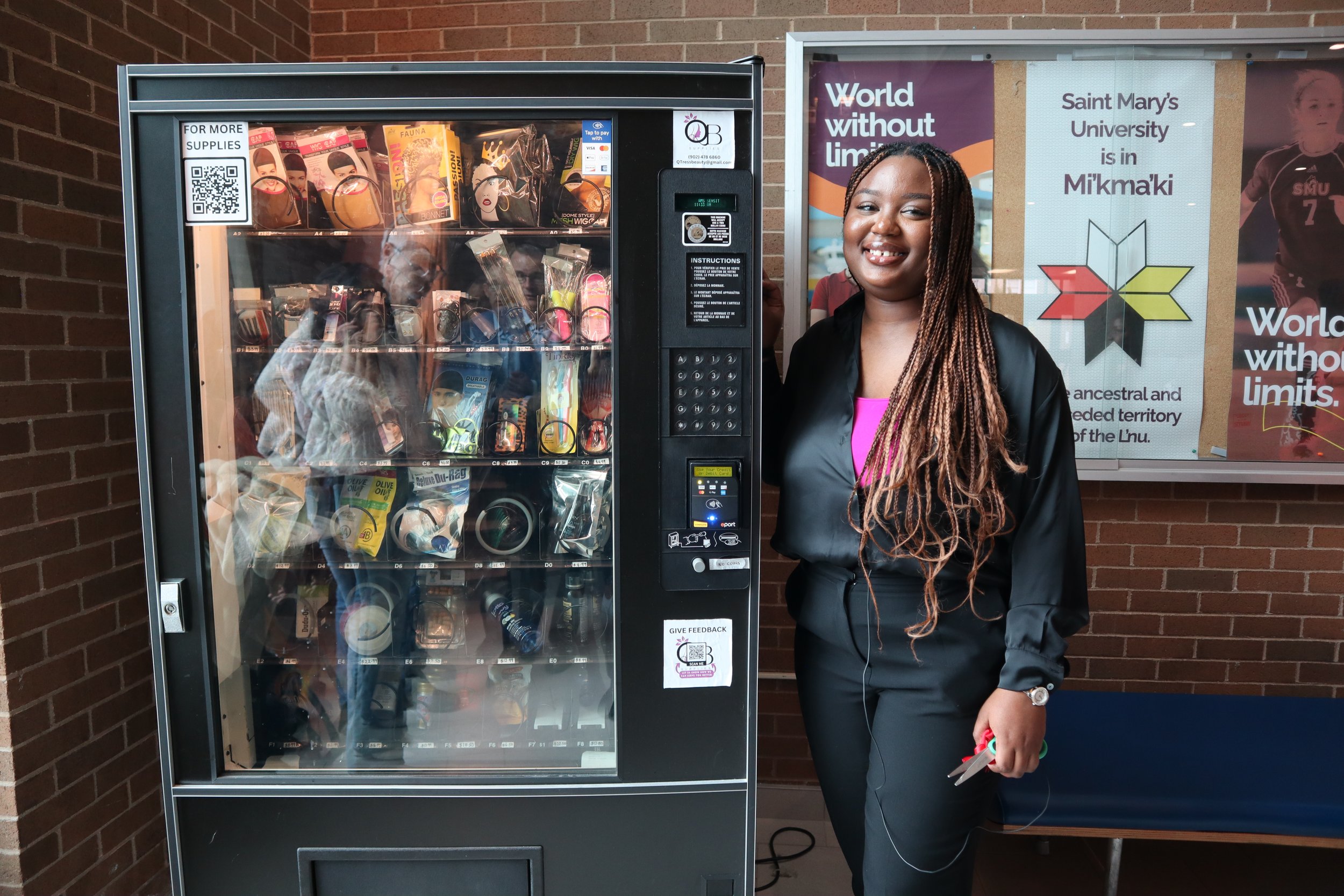
Queen-Esther Okundonor, a fourth-year Marketing and Finance student from Nigeria, has a passion for helping people. This passion led her to launch her new business, QTress Beauty Supplies, a vending machine located in the Loyola Academic Building on campus. QTress Beauty Supplies aims to provide convenient and easy access to hair and beauty care products for the diverse student body at Saint Mary’s University and Halifax at large.
Before opening in October, Queen-Esther had spent three years thinking about starting her own beauty supply business after learning about other vending businesses. At first, she was hesitant to make business plans while balancing her schoolwork and tuition payments, but she decided to give it a try.
Although Queen-Esther faced some ups and downs throughout the journey of planning and envisioning her business idea, she did not give up on her project. Instead, she worked harder. She learned to pivot when things did not work out. To Queen-Esther, the whole process was worth it because she was able to meet many supporters and gain a community.
This fall, friends, students, staff and faculty, including Saint Mary’s President Robert Summerby-Murray, gathered at the Arthur L. Irving Entrepreneurship Centre and celebrated the launch of QTress Beauty Supplies. The new vending machine, which carries a variety of beauty and hair care products for different hair and skin types, is located on the first floor of the Loyola Academic Building.
The story of Queen-Esther’s entrepreneurship journey inspired many students, igniting a spark of motivation and encouraging them to chase their own dreams. “When you look your best, you feel your best, and this should not be only a luxury,” says Queen-Esther.
Watch a CTV News story about Queen-Esther Okundonor and QTress Beauty Supplies: Easy access to Black beauty supplies | CTV News
Academic Integrity Week: Oct 30-Nov 2
Academic integrity is the foundation of higher learning. It refers to a set of ethical values relating to how we treat our sources of knowledge, and how new knowledge is constructed and shared with others. The values of academic integrity go beyond student citation mistakes, plagiarism, and cheating, as the technical manifestations of violations associated with it. Academic integrity is a shared responsibility among all members of the University community.
The aim of this week-long event is to engage students, faculty and staff in learning and sharing with others how they can uphold academic integrity to increase student success and promote the ethical values of scholarly dialogue and respectful knowledge creation.
Schedule of events
Faculty Panel on AI (Artificial Intelligence) and AI (Academic Integrity)
Monday, October 30
3-4:30 p.m.
Virtual Event
The panel will be moderated by Dr. Karen Grandy, Chairperson of the Academic Senate and the Senate Committee on Academic Integrity. Panelists include Academic Integrity Officers, members of the Academic Integrity Appeal Board, and Education Developer Julian l’Enfant from The Studio for Teaching and Learning.
Bring your questions, challenges, and ideas about maintaining Academic Integrity in our classes now that Artificial Intelligence tools are widely available for everyone to use.
Zoom link
Meeting ID: 826 4860 0695 Passcode: 603419
Citation Station: activities, fun AI resources and prizes
Tuesday, October 31
1-4 p.m.
Student Common Space, 5th Floor of the Student Centre. Drop-by station.
Visit us at the Citation Station on the 5th floor of the Student Centre from 1-4 p.m. to learn about citations and plagiarism, to receive writing and referencing help on your papers and for the chance to win prizes!
Avoiding Academic Mistakes Workshop
Wednesday, November 1
11:30 a.m.-12:45 p.m.
Virtual Event
Chat with the Writing Centre and Library staff about academic integrity and get tips to help you with writing a paper, assignment, or test. Learn how to avoid common academic mistakes! This workshop is designed to provide you with resources to help with your writing, research, and proper citations/references.
Zoom link
Passcode: academic
Intersections Between Copyright and Academic Integrity
Thursday, November 2
2-3 p.m.
Virtual Event
Copyright is more than knowing the limits of what you can copy. Whether you’re using images, videos, or scholarly sources, there are many scenarios where knowledge of copyright can be helpful – from knowing how to apply exceptions found in the Canadian Copyright Act to what you need to know before you submit your completed thesis. Join Suzanne and Patricia as they explore the intersections between copyright and academic integrity.
Presenters:
Suzanne van den Hoogen MLIS, University Librarian and Copyright Officer
Patricia Langille, MA, Copyright Assistant
Microsoft Teams link
Meeting ID: 229 086 915 918
Passcode: PzxmqJ
Saint Mary's University shines at Atlantic Schools of Business Case Competition
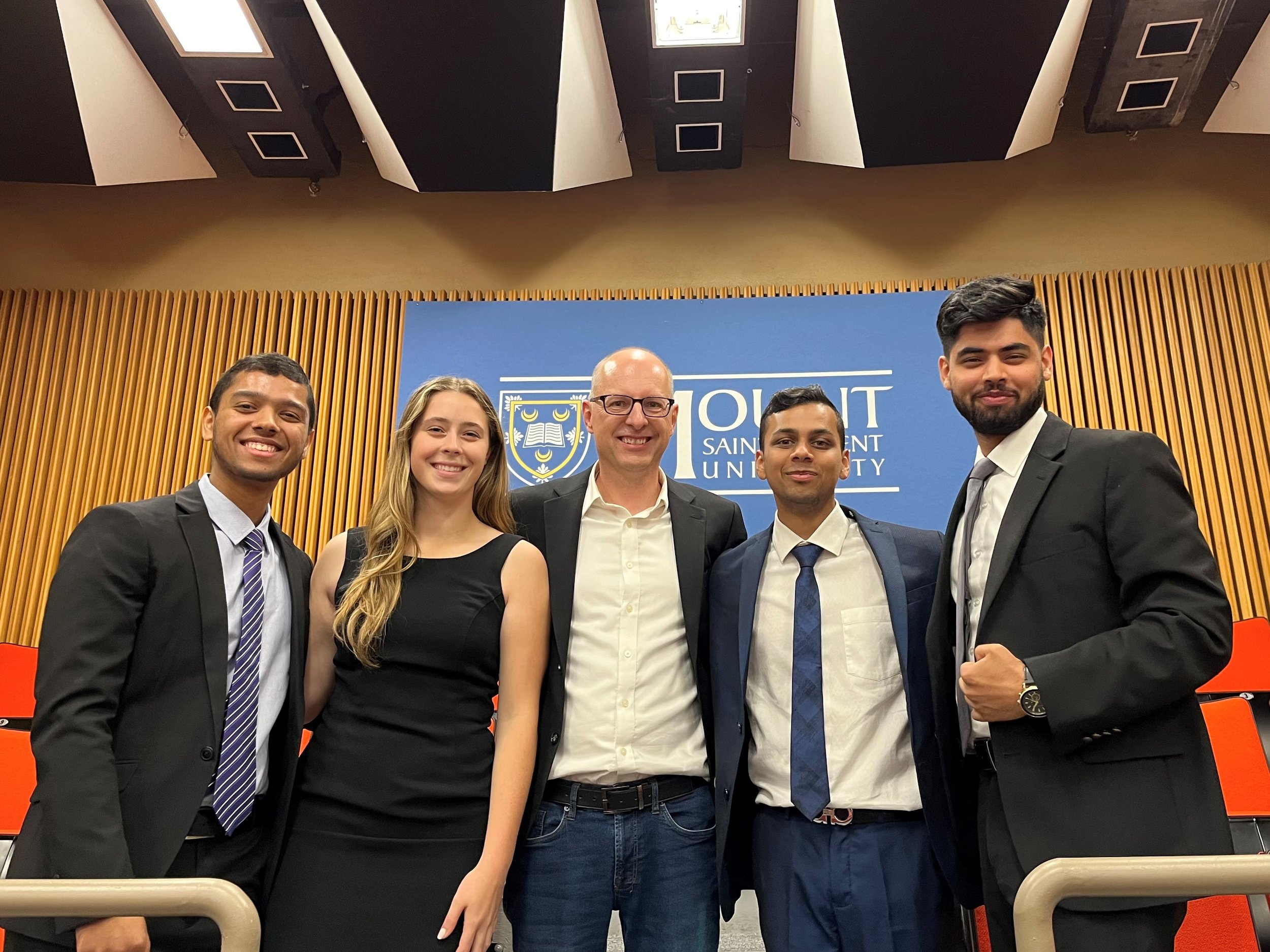
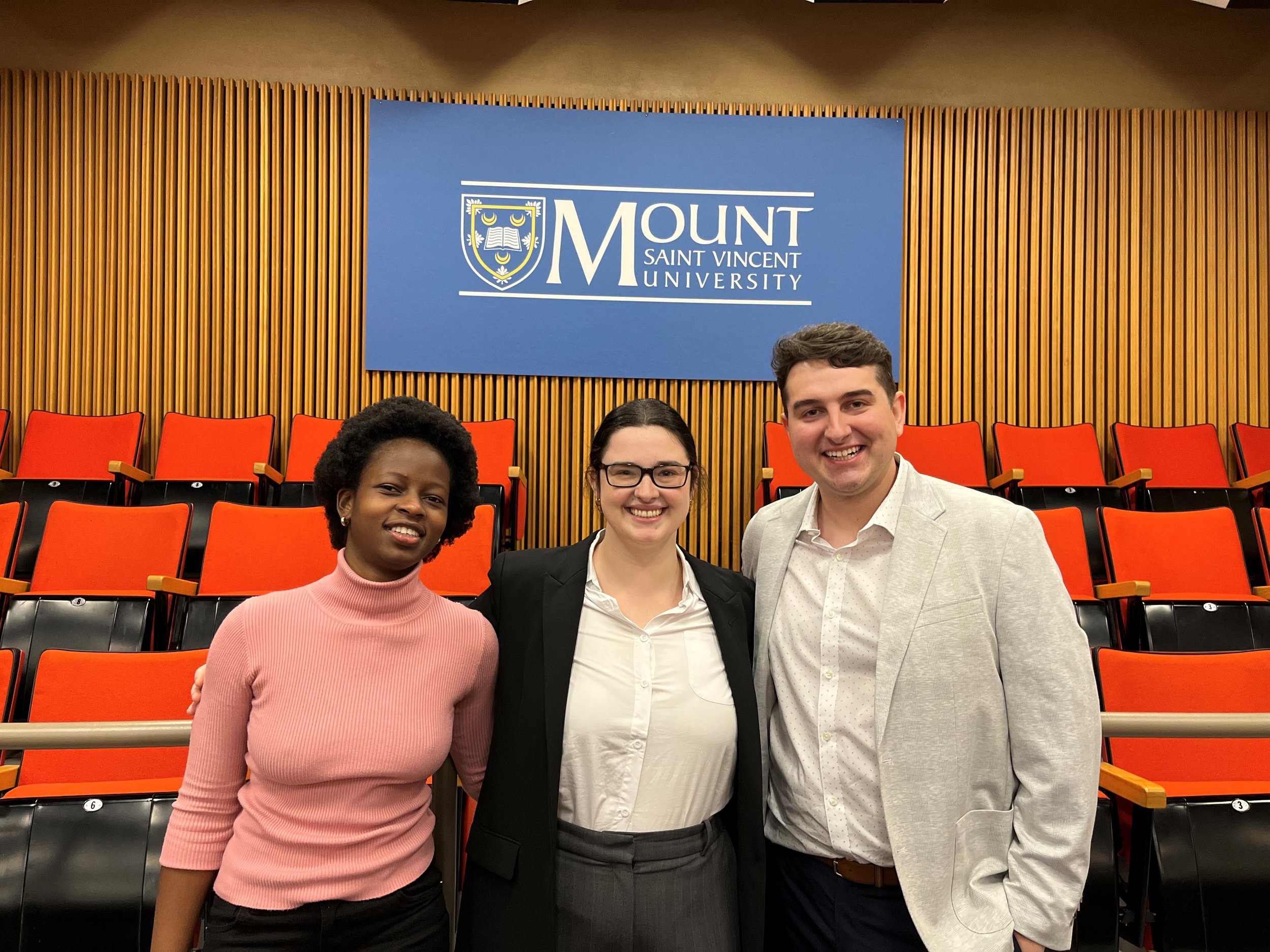
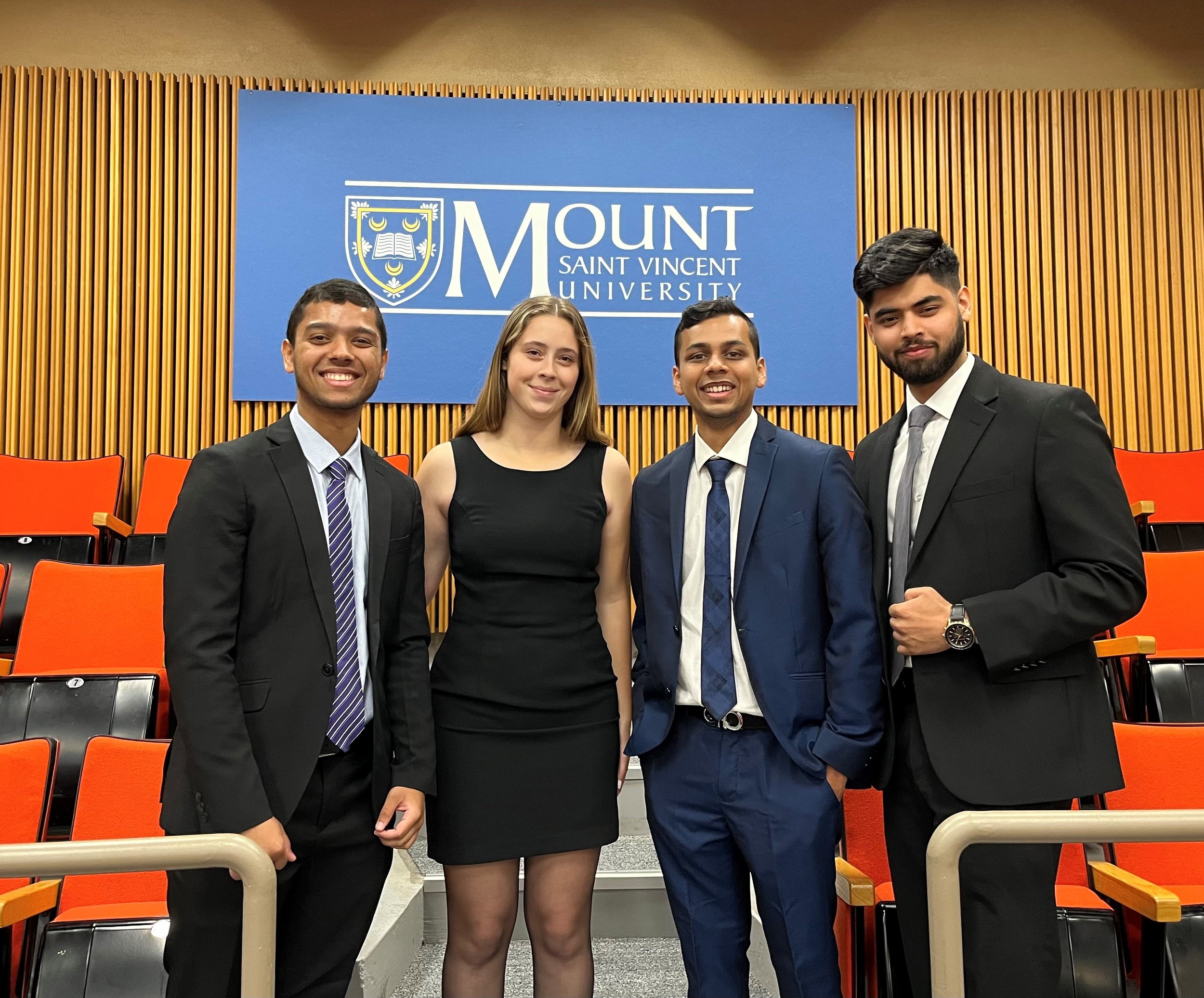
On September 24, Sobey School of Business Bachelor of Commerce students Lauren Golding, Shiva Kakkar, Ramji Srinivasan and Ashish Ganapathy walked away with a second-place win at the Atlantic Schools of Business (ASB) Case Competition sponsored by Grant Thornton LLP (Canada), hosted by Mount Saint Vincent University. The competition was part of the annual ASB Conference—one of Canada’s longest-running academic business conferences.
“I had a wonderful, enriching and insightful experience at the ASB Case Competition,” said Ganapathy, a third-year BComm student majoring in Accounting and Finance. “I prepared forecasts using financial analysis techniques and improved my public speaking and financial analysis skills.”
Teams representing universities across the Atlantic provinces participated in a competition where students were asked to analyze and create a solution to a business case (a narrative about a real-life company and the problems it’s facing) and present it to a judging panel. This year’s business case was centered around a Newfoundland-based Childcare Cooperative in need of expansion to meet the overwhelming demand for such services.
“It was a proud moment for our team. Our case was based on real challenges faced by Atlantic Canadians—immigration and population growth. We were tested on an array of skills like critical thinking, quantitative and analytical skills.” said Shiva Kakkar, a second-year BComm student majoring in Finance. “Jeff Muton, professor for the BCOM 4481 Business Case Competition course, provided excellent mentoring throughout our preparation for the competition. The learning experience was exceptionally valuable, as we acquired a solid framework for effectively tackling business cases.”
The Bachelor of Commerce Business Case Competition course takes students from classroom learning to real-world challenges. Students get to test their abilities to think on their feet and compete against other students, in consultation with industry leaders.
At the Sobey School of Business, students will not only learn how to do business well, they’ll learn how to do business for good.
Sobey School undergrad contributes to COVID research for Scientific Reports
Kyle Morton BComm’23
Kyle Morton had yet to complete his undergraduate degree at Saint Mary’s University when he used machine learning in a ground-breaking study of the COVID-19 virus for Scientific Reports. To contribute to an article in the world’s largest scientific journal would be an accomplishment for more experienced researchers. For Morton, it was a miracle.
“I remember when my economics professor, Yigit Aydede, told me the article had been accepted,” said Morton. “I jumped out of my seat and clapped my hands. It was another fantastic experience that Saint Mary’s made possible.”
Morton participated in the research project over six months during 2022, when he linked two large data sets, one from Statistics Canada and the other from Nova Scotia’s 811 system that recorded influenza symptoms during the first four months of the COVID-19 pandemic.
Dr. Yigit Aydede and Kyle Morton work together examine data for their research
The resulting article by Saint Mary’s University’s Dr. Yigit Aydede, and Jan Ditzen, Free University of Bolzano, Italy, Identifying the regional drivers of influenza-like illness in Nova Scotia, Canada, with dominance analysis - Scientific Reports, unveils a new methodology, one that may assist health officials to both predict where viruses will spread and target interventions to halt them. Read more about the study.
“Working with large data sets, it is easy for errors to go unnoticed, because you cannot visually inspect them. The challenge was: How do you make sure there are no mistakes that will end up leading to the wrong conclusions when you actually perform your analysis?”
Morton sees machine learning as a third form of statistics, one that is predictive. Once he had prepared the data, making sure it was clean and free from errors, Professor Aydede and the research team used powerful algorithms to combine both sets. The results revealed the spatial as well as the temporal spread of the virus in real-time, something that was only possible due to the extraordinary and detailed data concerning COVID-19 symptoms, unparalleled access to Nova Scotia’s 811 records and the unique adaptation of algorithms originally designed for the finance industry.
The opportunity to study and work alongside Dr. Aydede in the Sobey School of Business has transformed Morton’s career aspirations, inspiring him to use machine learning to solve problems.
“I chose Saint Mary’s because it had a very good reputation for its business school. I liked the smaller yet international campus and the undergraduate focus. I gained a lot more experience, working with my peers and my professors one-on-one; I would not have had the same opportunity at other, larger institutions.”
While studying in the Bachelor of Commerce program at the Sobey School of Business, Morton was the recipient of two scholarships from donors to Saint Mary’s University: The Chrysler Canada Scholarship and the KPMG Future Leaders Scholarship. He also received the Fred and Ruth Stork German Studies Award from Waterloo University. This Fall, Morton begins his Master’s in Data Science at the London School of Economics, something he describes as “a dream come true.”
Archaeology field school illuminates everyday life in ancient Roman villa
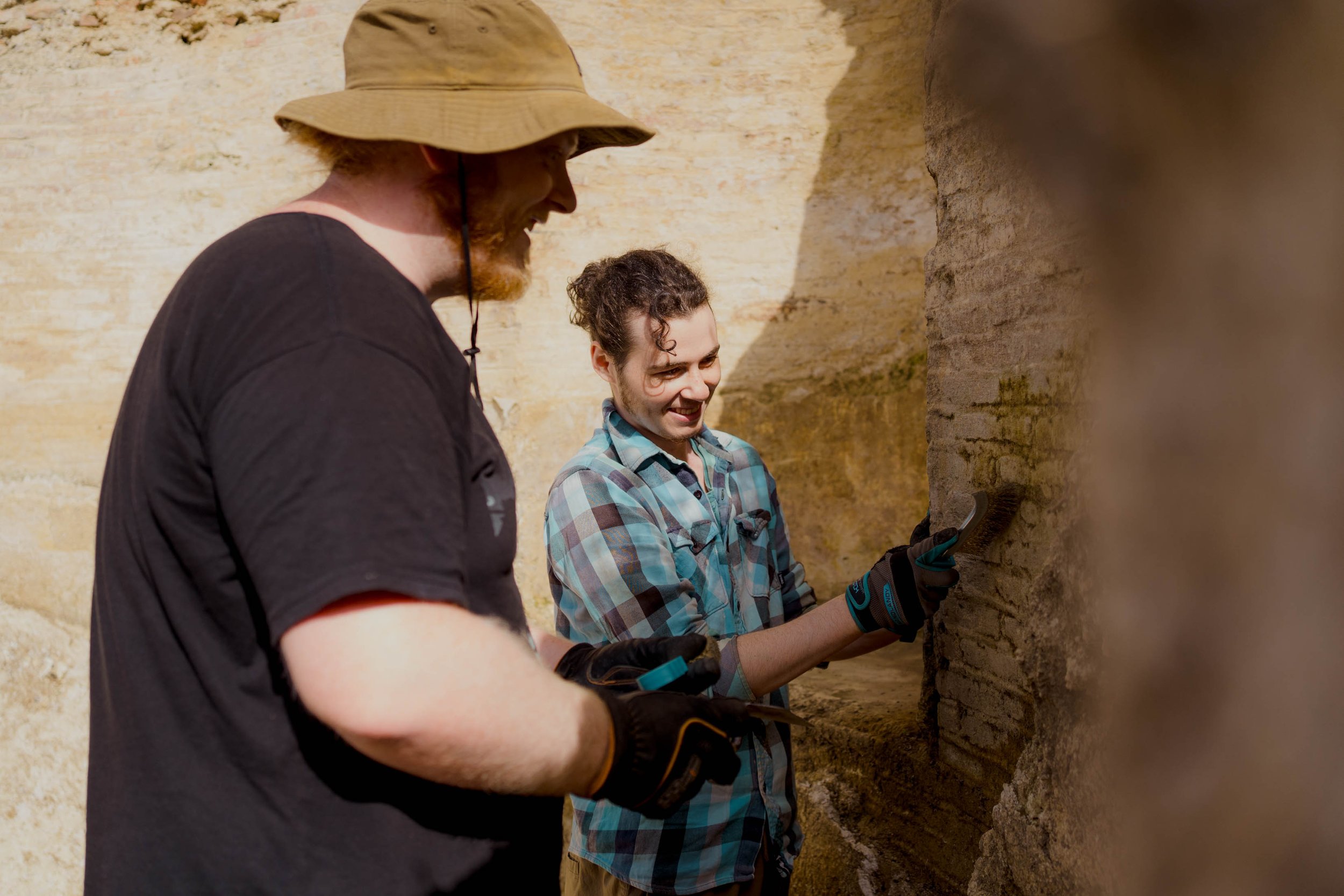
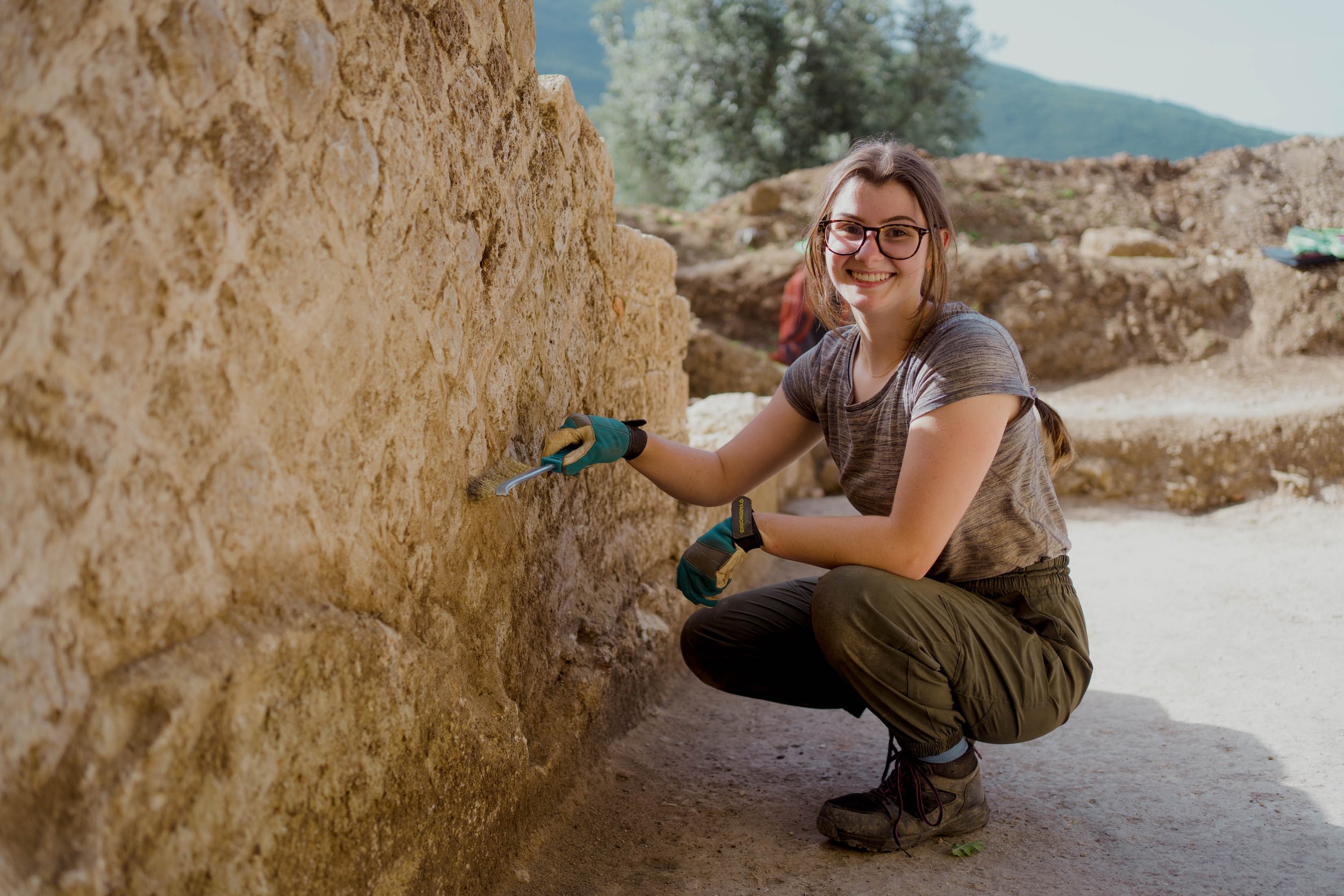
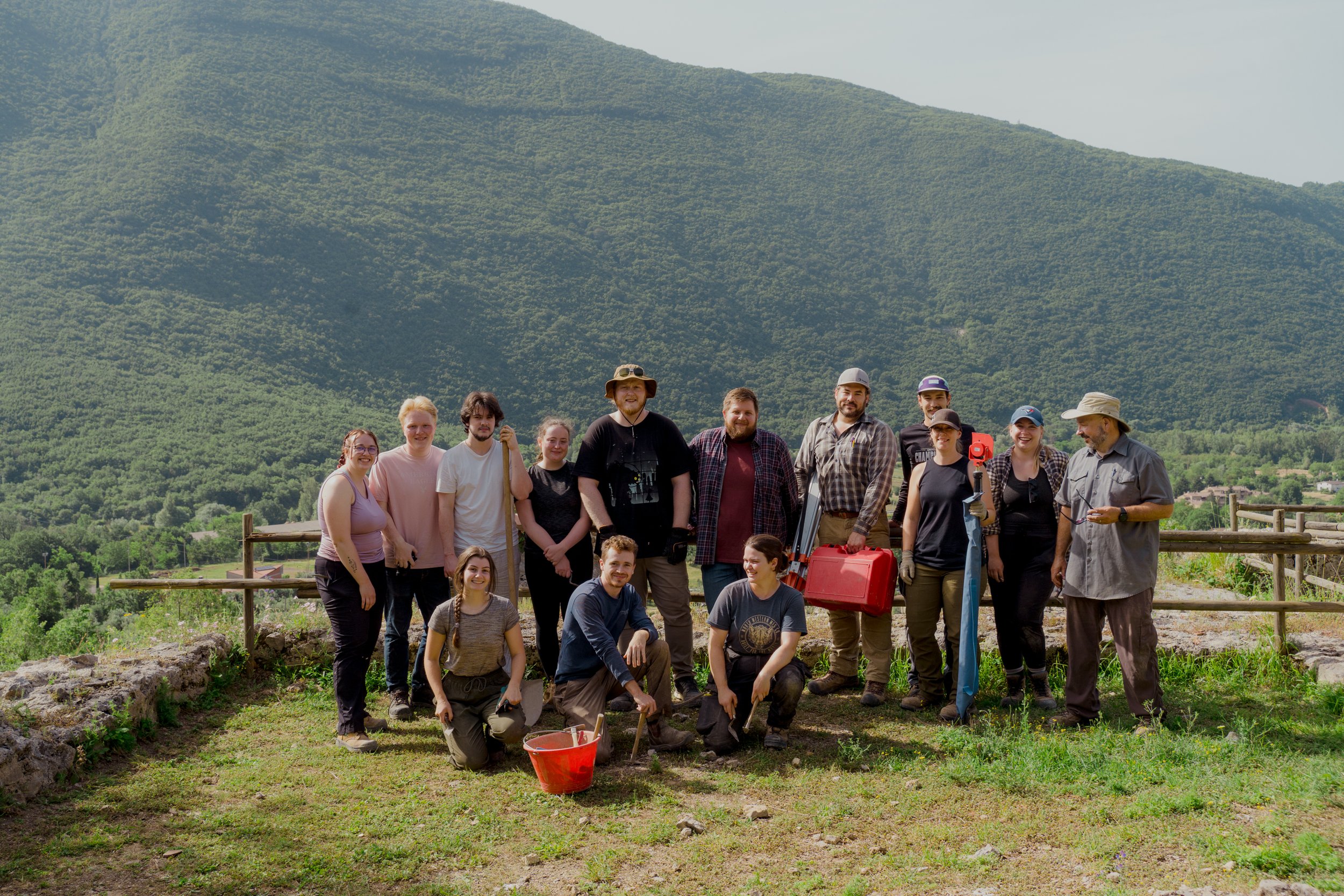
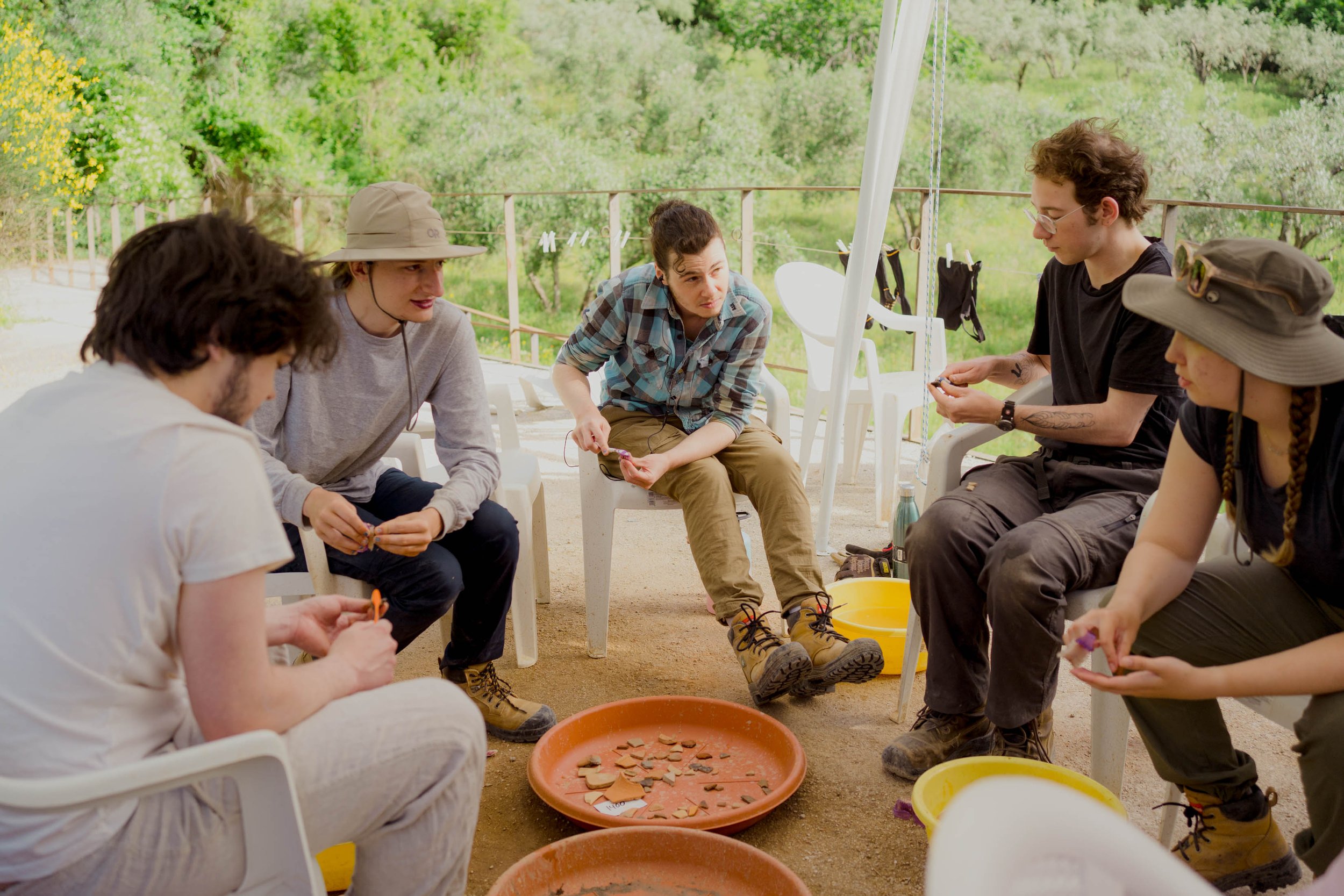

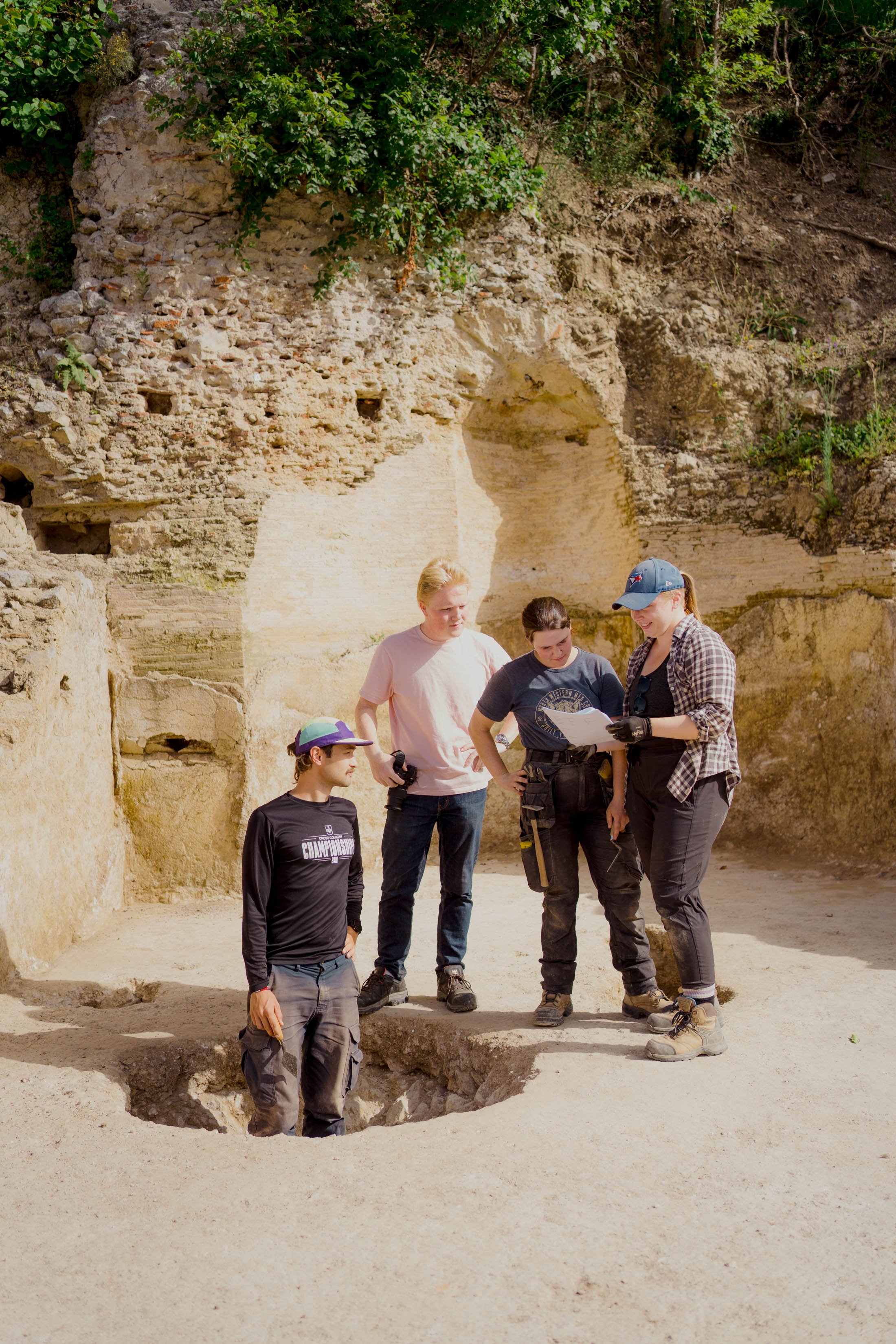
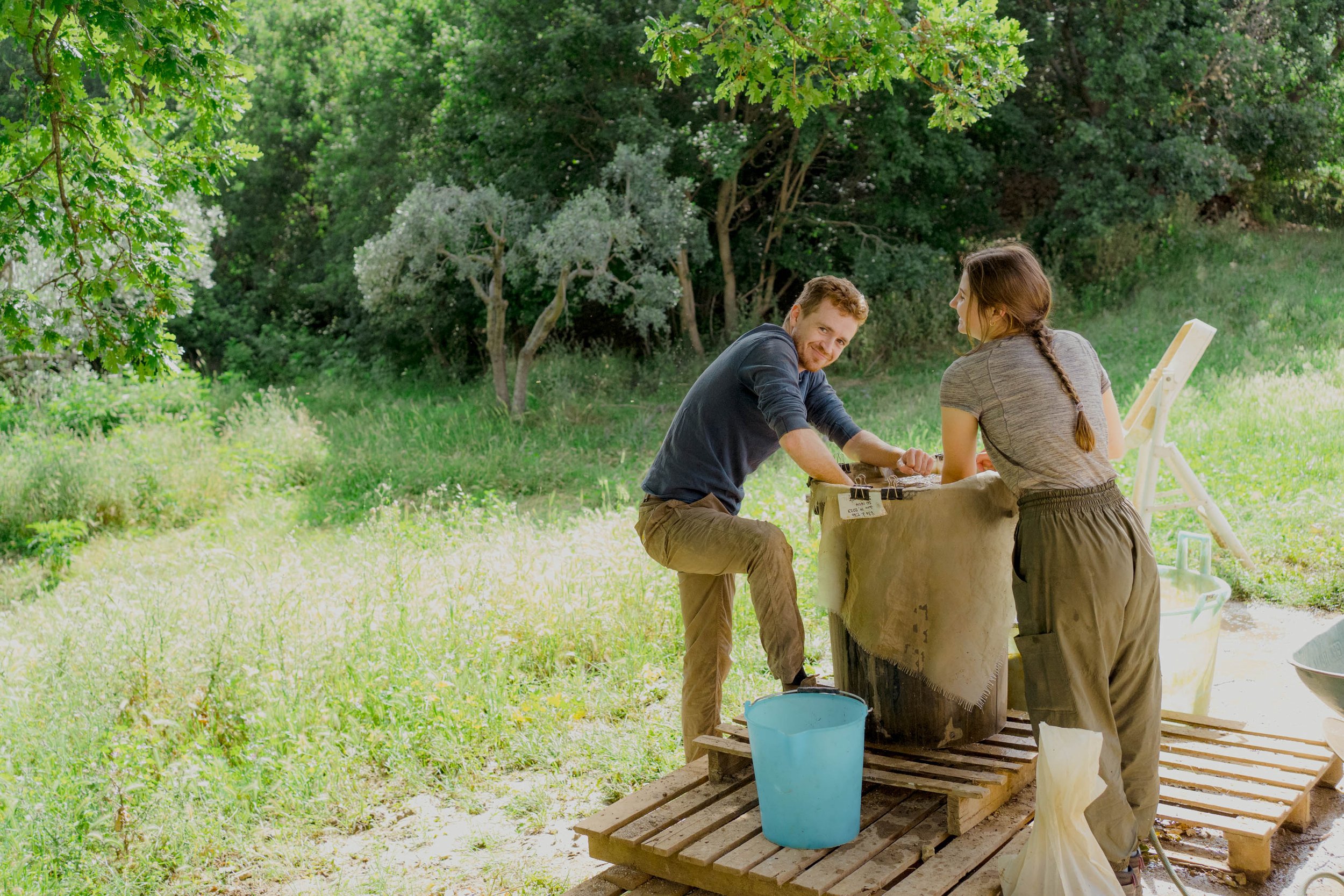

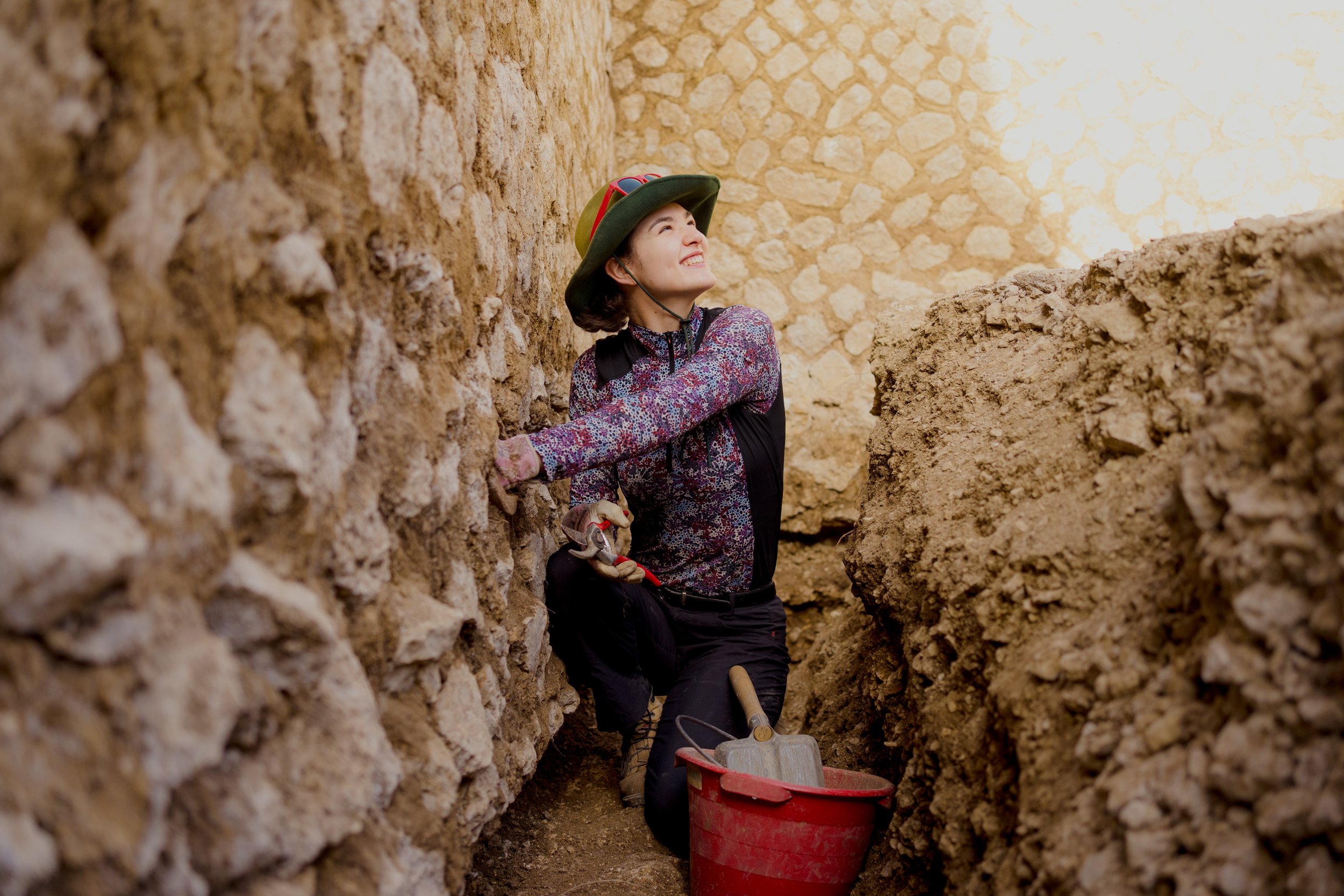
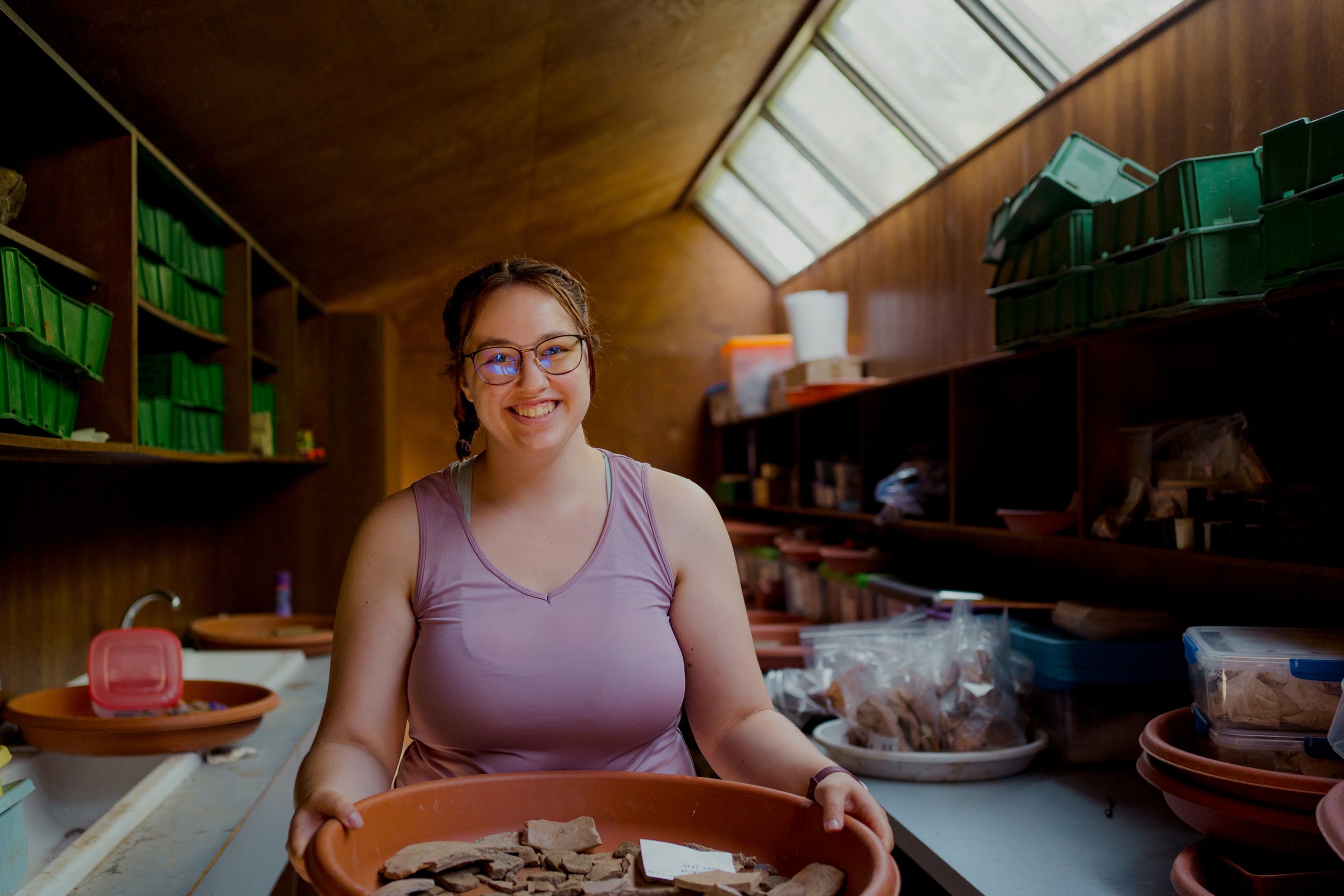

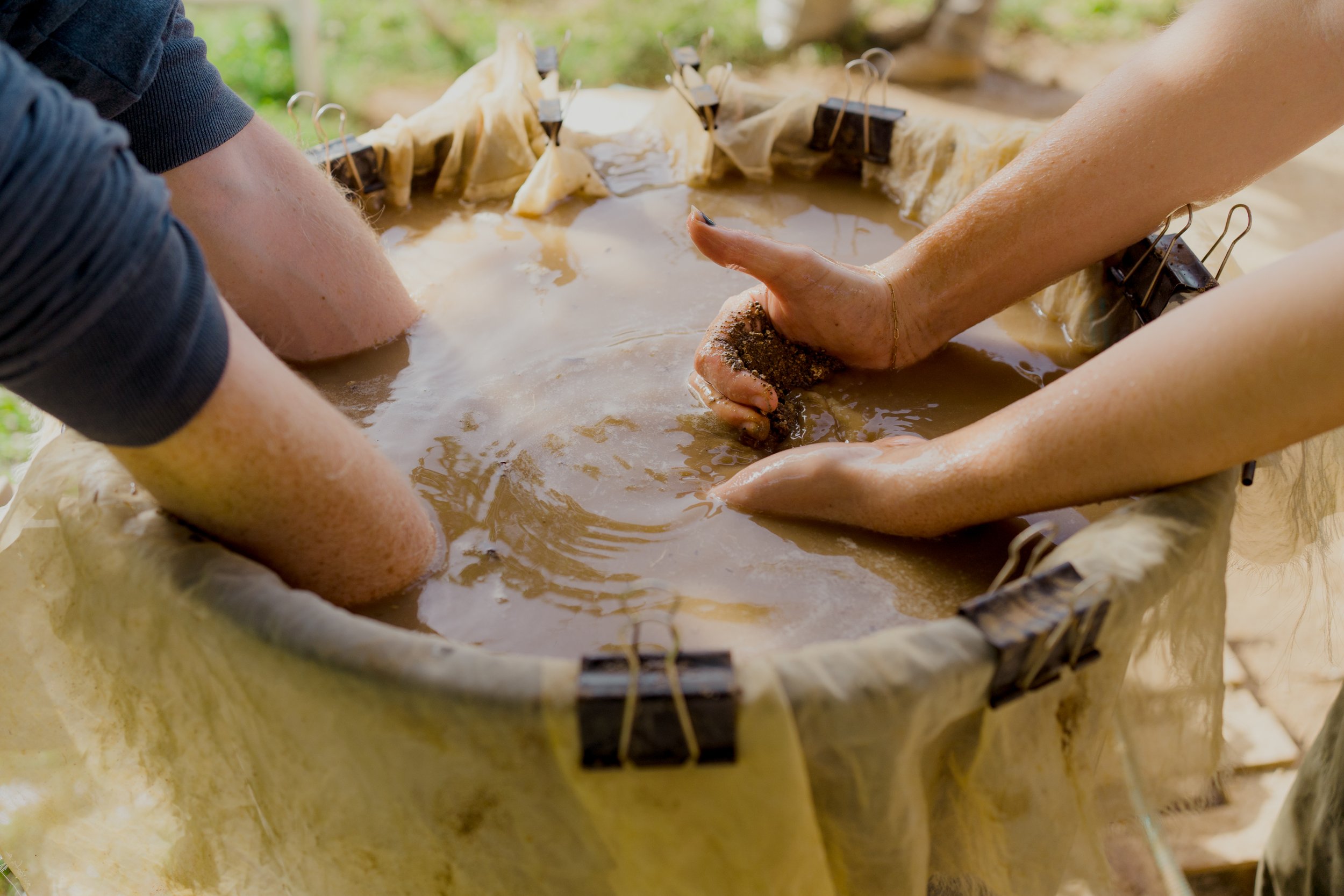


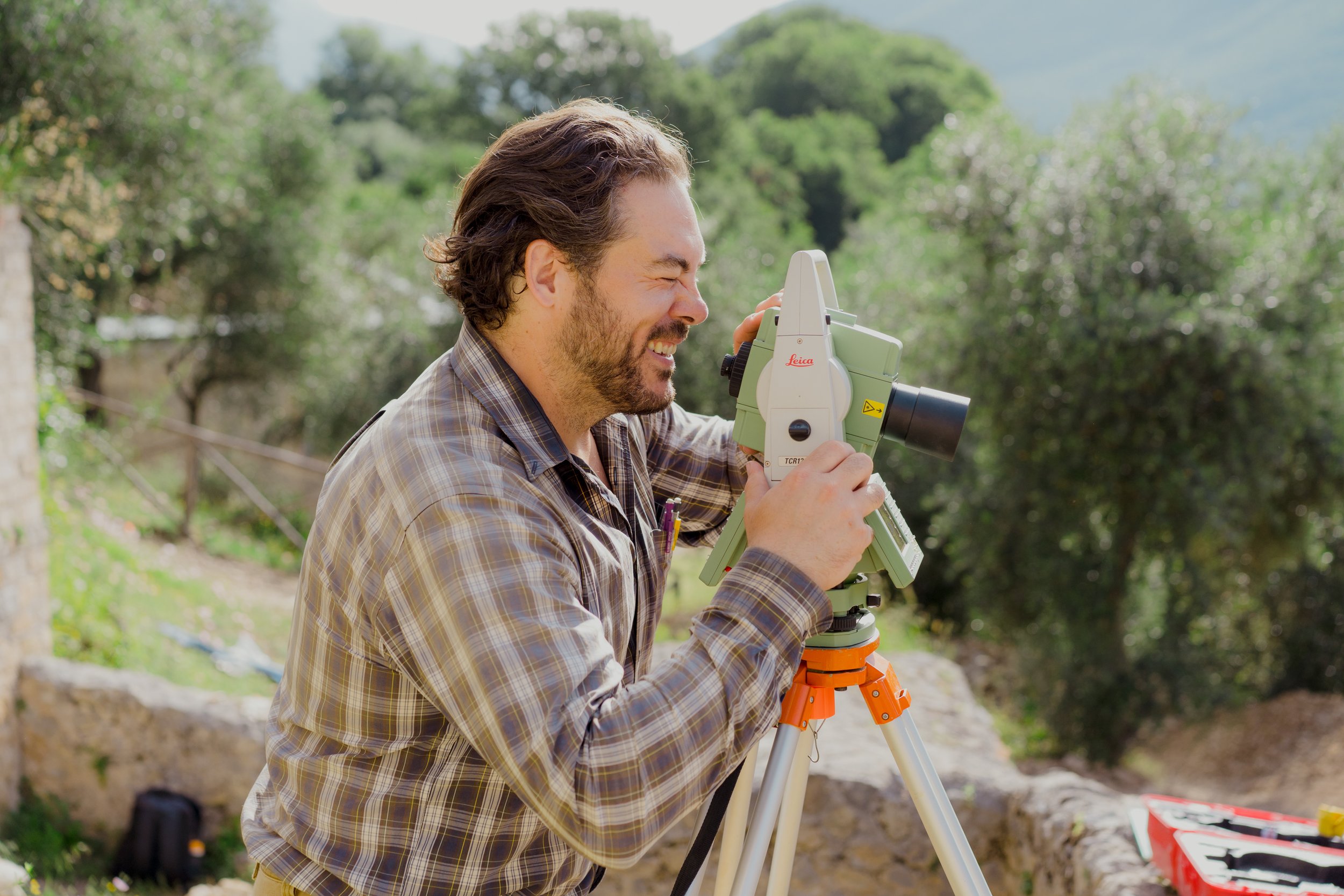
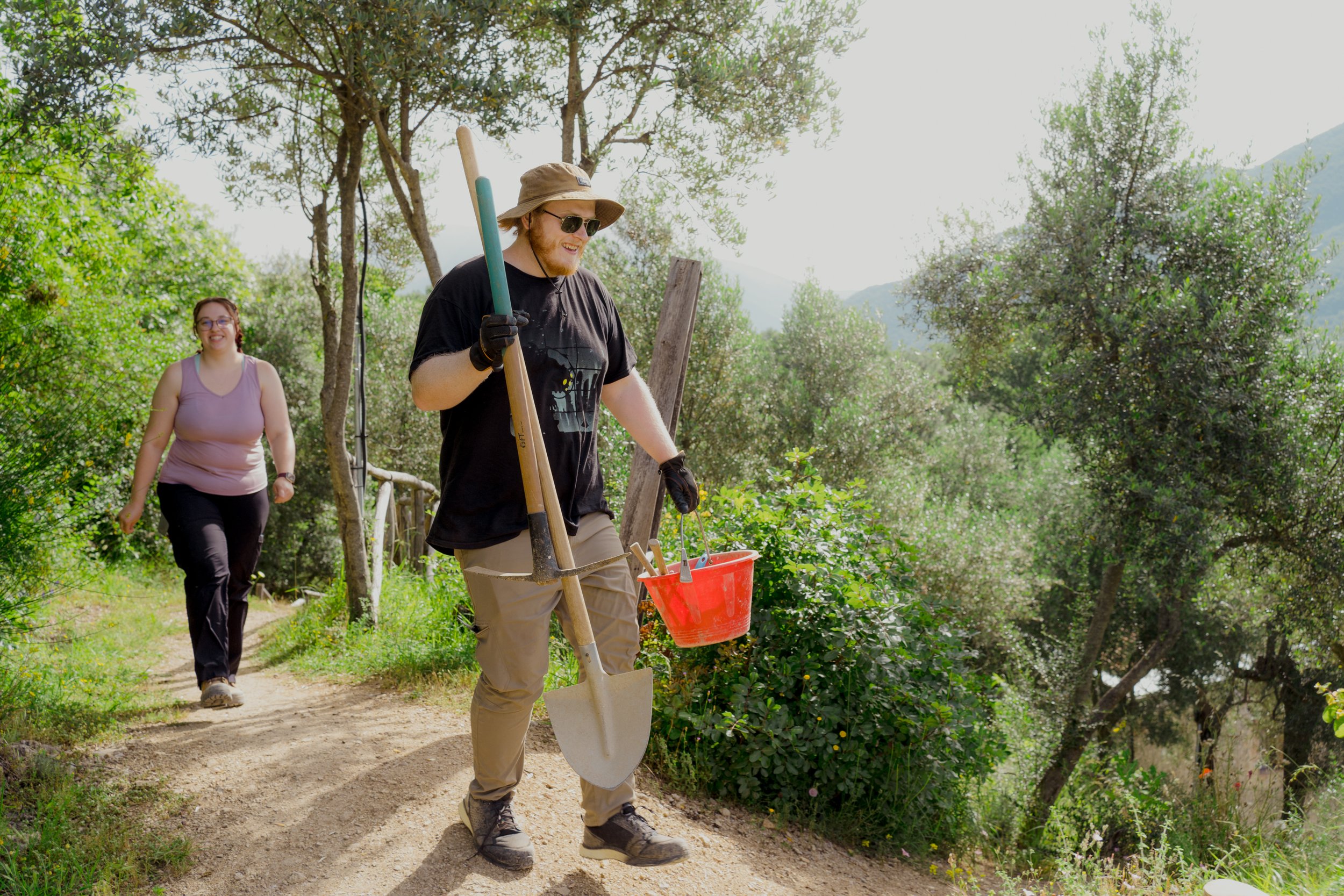

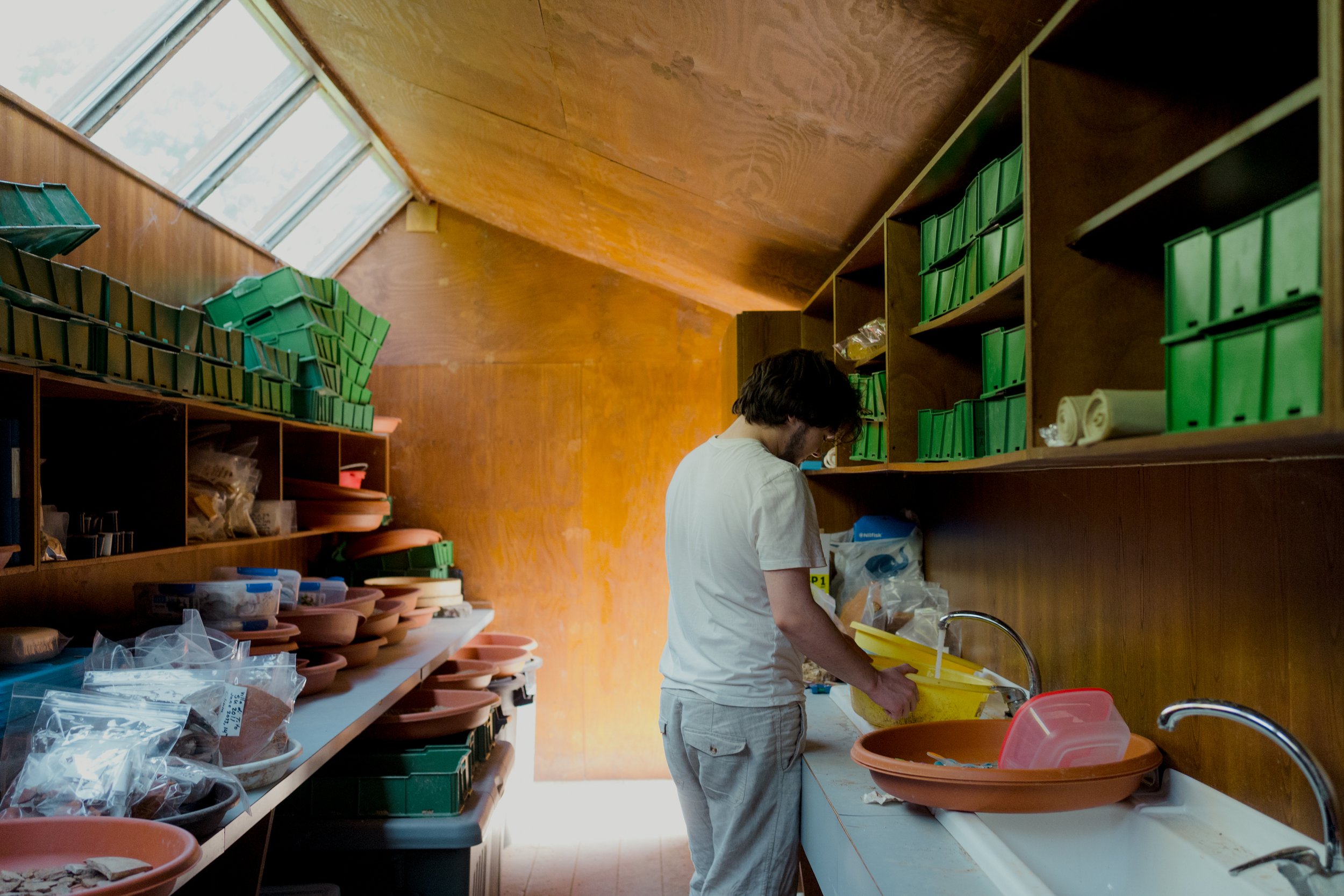
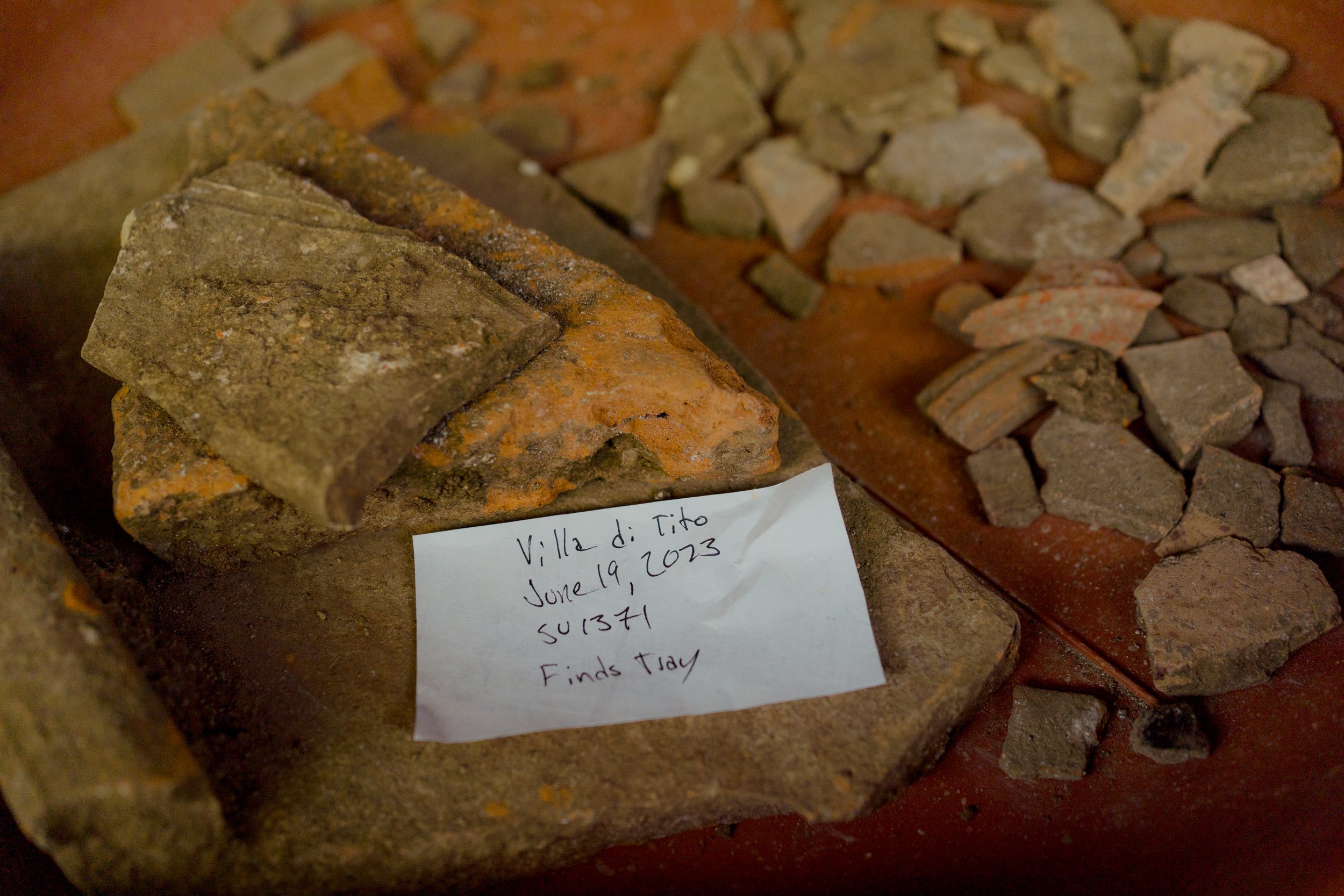
Students at Saint Mary’s University are helping to peel back layers of the past at a Roman villa dating back more than 2,000 years in central Italy. A vivid story from ancient history is emerging at the Villa of Titus excavation site in the Apennine mountains, about 70 kilometres northeast of Rome.
“Based on the artifacts recovered this year, it seems mostly likely that the building was residential,” says Dr. Myles McCallum, Associate Dean of Arts and co-director of the archaeological research project that is also home to a field school. “We found toiletry items such as bronze tweezers and spoons for applying makeup, bits of furniture one might find in a Roman house and lots of pottery used for cooking, all of which indicate a domestic use of the building.”
Eleven Saint Mary’s students and two alumni participated in the field school this May and June, along with six students and several researchers from McMaster University. Offered by the Ancient Studies program in our Department of Languages and Cultures, the study abroad opportunity launched in 2018 and also took place in 2019 and 2022. By working on an active research site, students learn the basics of environmental archaeology, excavation and artifacts analysis, and some even contribute to published research reports and articles.
“These skills all build on each other. You dig things up physically, clean things off and take pictures and drawings of them to try and understand and identify them. You measure them, you fill out paperwork, you log information into a database,” says McCallum.
“You put it all together and it adds to that understanding of what life was like 2,000 years ago in a different part of the world. It engages every part of your brain, the frontal lobe big-picture stuff. So that’s a big deal for students because no matter what you do in life, you’re going to have to be able to pose questions and figure out how to answer them.”
The research follows a theory that the monumental two-storey structure was built in the first century BCE for the emperor Titus, who reined 79-81 CE during the Second Dynasty of the Roman Empire. As more of the intact brick walls emerge from the hillside, “we understand much more about the building’s overall plan, as a villa with a central courtyard on a large terrace,” says McCallum.
Researchers found evidence this year that the complex was occupied for about 120 years. They also discovered signs of a previous building at the site, which had an adjacent well and large garden area.
“So people were there for a few hundred years in the smaller building, then built something much bigger on top of it. We also know that the villa went out of use in the second century CE, but we’re not entirely sure why,” McCallum says.
The main goal of the project is to reconstruct the daily lives of the enslaved workers, the subaltern people who grew crops, made bricks and wine, pressed olives for oil and engaged in cleaning, building, mining, woodworking and metalworking. Much of their economic activity may have taken place in the building’s basement (cryptoporticus), which had a large storage room, a door where carts could load and unload, and possibly also living quarters.
“Next year, we’re going to expand our exploration of this basement area,” says McCallum. The first step will require heavy equipment to remove hundreds of tonnes of stone and earth that had collapsed into the lower level, and then students will have a chance to excavate.
“It’s interesting because we think we know a lot about slaves during the Roman Empire, but nobody wrote about them, at least not from a social-historical perspective. So archaeological evidence is really the only direct evidence we have of what their lives were like. As a focus of research, it’s pretty recent,” says McCallum.
The villa sits high above the Velino Valley’s Lago di Paterno, a freshwater lake considered to be Italy’s geographical center and a once-sacred site connected to the goddess Vacuna. The University of London is conducting archaeobotanical research there with pollen coring, studying changes to the landscape and its flora and fauna over a 15,000-year period. “So that will be interesting, to tie in the human relationship with the landscape and environmental history too,” says McCallum.
Other notable finds have been oil lamps, bronze coins, glass perfume bottles, mosaic flooring and tiles, and transport amphorae (containers) that carried goods from as far as Spain and North Africa. Also intriguing is evidence of a ritual to seal off a well—including a silver mirror and a baby suckling pig, both sacrificed in hopes of a divine blessing for the house being built over the well.
The Villa of Titus project team also includes co-director Dr. Martin Beckmann of McMaster University and researchers from universities in Italy, the U.K. and the U.S. With support from the Social Sciences and Humanities Research Council, Saint Mary’s is building on its existing strengths in archaeology research and education, deepening its cultural exchanges and academic connections with Italy’s museums, archaeologists and academic community.
“Experiential learning and study abroad opportunities are an important element of what we do in our program and in the Faculty of Arts,” says McCallum. “We’re working on developing more of these opportunities, and our students are embracing the chance to do this.”
Three other field schools took place in Italy this summer, including Sacred Space: Rome, from Ancient to Modern, offered by the Department for the Study of Religion, plus two in the Pisticci region, under a new dual stream Colonialism and Migration: Ancient and Modern field school:
the SJCS Migrant Justice Field School, offered by the Department of Social Justice & Community Studies; and
the Metaponto Archaeological Field School, led by Dr. Sveva Savelli and the Ancient Studies program for the second year in a row













